






















icpas.org / insight.htm
34 CFO 2010
B y C a r o l yn Ta n g
As the role of the chief financial executive evolves and expands, we explore three developing areas that weigh on today ’ s finance leader
38 Go Green
B y K r i st i n e B l en k h o r n Ro d r i g u ez
The markets are in flux The accounting rules and federal regulations are still under construction Universities don’t provide it as a standard area of focus And yet, the age of green accounting is dawning
42 A White, White-Collar Profession?
B y Ja c q u el i n e B a b b
Filling the pipeline with talented young accounting professionals is the problem; boosting minority representation could be the solution
16 Global The Overseas A-List
B y Sel en a C h a vi s
Global hotspots for career advancement and what to learn while you ’ re there.
18 Specialization Crime Busters
B y D er r i c k Li l l y
Finance gurus play a key role in bringing criminals to justice
22 Planning Public or Private?
B y Sh er yl N a n c e - N a sh Which career route should you choose?
24 Recruiting Chasing the Millennial
B y C h r i st i n e B o c k el m a n
Small firms set their sights on the Facebook Generation
28 Talent The Perfect Internship
B y A l l i so n E n r i g h t Make it a success, on both sides of the desk
32 Retention Flex People
B r i d g et Mc C r ea
What ’ s the ROI of a flexible work environment?
4 First Word
A message from the Illinois CPA Society ’ s President & CEO
6 Seen & Heard
News bytes, sound advice and practical business tips
10 Tax Insight Transparency Rules
B y H a r vey C o u st a n , C PA
Moves to make the IRS exam process crystal clear
12 Fraud Insight The Right Stuff
B y Brad Sargent, CPA/CFF, CFE,CFS, Cr FA , FABFA

Are you forensic accountant material?
14 Retirement Insight Money Hungry
B y Ma r k J Gi l b er t , C PA /PF S
Balancing risk and reward in the eyes of income - oriented clients 46 Classifieds 46 Advertiser Index
48 Time & Talent
A shout out for ICPAS member volunteers
Garelli Wong and Jackson Wabash are Chicagoland’s experts in financial recruiting and staffing.
Our team unites employers with the right accounting and finance talent for direct hire, temporary and consulting assignments. We look and listen beyond the job description to combine the right skills with the desired experience.
To learn more about our dedication to finding the right fit, visit us on the web or call your local office.

Finding the perfect fit doesn’t have to be a challenge, it’s what we do.
Publisher/ICPAS President & CEO Elaine Weiss
Editor-in-Chief/Director of Publications Judy Giannetto
Creative Services Director Gene Levitan
Creative Services Manager Rosa Garcia
Publications Specialist Derrick Lilly
National Sales & Advertising Angie VanGorder
YGS Group, 3650 West Market Street, York, PA 17404
P: 800 501 9571 x176 F: 717 825 2171
E: angie vangorder@theygsgroup com
Circulation/Member Services Director Ron Jankowski
Editorial Offices: 550 W Jackson Blvd , Suite 900 Chicago, IL 60661
I C P A S O F F I C E R S
Chairperson, Sara J Mikuta, CPA Leaders Bank – Operations Center
Vice Chairperson, Robert E Cameron, CPA Cameron, Smith & Company PC
Secretary, Daniel F Rahill, CPA, JD KPMG LLP
Treasurer, James P Jones, CPA Edward Don & Company
Immediate Past Chairperson, Lee A. Gould, CPA/ABV, JD, CFE, CFF Gould & Pakter Associates LLC
I C PA S B O A R D O F D I R E C T O R S
Brent A Baccus, CPA, Washington Pittman & McKeever
William P Graf, CPA, Deloitte & Touche LLP
Edward J. Hannon, CPA, JD, Freeborn & Peters LLP
John A Hepp, CPA, Ph D, Grant Thornton LLP
Cara C Hoffman, CPA, Blackman Kallick LLP
Geralyn R Hurd, CPA, Crowe Horwath LLP
Leif J Jensen, CPA, Leif Jensen & Associates Ltd
Elizabeth A Murphy, PhD, CPA, DePaul University
Annette M O’Connor, CPA, RR Donnelley & Sons Company
Michael J Pierce, CPA, RSM McGladrey Inc
J Bradley Sargent, CPA, Sargent Consulting Group LLC
Edward H Stassen, CPA, Recycled Paper Greetings Inc
Reva B. Steinberg, CPA, BDO Seidman LLP
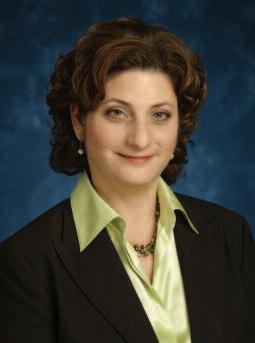
Modern life makes so many things seem out of our control. Fortunately, though, image a concept or impression that can be created or modified is something we can control
Being caretakers of the CPA image isn’t an easy task, however People have a lot of different ideas about what CPAs do, though they’re most likely to think of taxes and tax season first and foremost While this is an important area of a CPA’s work, we want people to know they can turn to CPAs for help with much more CPAs are at work 365 days a year on matters p e r s o n a l a n d c o r p o r a t e , o n t h i n g s a s s i m p l e a s a r e t i r e m e n t p l a n a n d a s c o m p l e x a s a c o m p a n y ’s strategic risk assessment
As part of our image-building efforts, the ICPAS actively promotes the CPA’s values of trust, integrity, respect and pride, and seeks opportunities to positively position CPAs and the profession in the public eye. Our objective is to show the public the impact CPAs make through the important work they do each day.
In the first three months of the year, members were featured in more than 20 interviews within print, radio and TV outlets, including Channels 2, 7 and 9 They’ve talked to audiences about underwater mortgages, unemployment, and the new consumer credit card legislation, to name a few of the many areas Through Society press releases and online consumer resources they provided guidance for a better financial future Nearly 5,000 people read the Society’s article about ways to better manage your money in the New Year when it appeared on the Chi cago Tri bune’s Triblocal.com.
Participating in our public service programs, CPAs have made lasting impressions on people’s lives. Take the army operations sergeant who recently returned from Afghanistan and participated in the Military Tax Preparation Program, for instance The volunteer CPA who worked on his tax return caught a previous tax preparer ’s mistake, which resulted in an additional $3,000 Not surprisingly, the soldier described his CPA volunteer as “awesome ”
An image is more than a two-dimensional picture or an impression you create by what you wear or how you act At the ICPAS, the CPA image is all about who you are and what you do for somebody else -because that’s what people will remember
El ai ne W ei ss, ICPAS Presi dent & CEO
INSIGHT is the official magazine of the Illinois CPA Society, 550 W Jackson, Suite 900, Chicago, IL 60661, USA Its purpose is to serve as the primary news and information vehicle for some 23,000 CPA members and professional affiliates Statements or articles of opinion appearing in INSIGHT are not necessarily the views of the Illinois CPA Society The materials and information contained within INSIGHT are offered as information only and not as practice, financial, accounting, legal or other professional advice Readers are strongly encouraged to consult with an appropriate professional advisor before acting on the information contained in this publication It is INSIGHT’s policy not to knowingly accept advertising that discriminates on the basis of race, religion, sex, age or origin The Illinois CPA Society reserves the right to reject paid advertising that does not meet INSIGHT’s qualifications or that may detract from its professional and ethical standards The Illinois CPA Society does not necessarily endorse the non-Society resources, services or products that may appear or be referenced within INSIGHT, and makes no representation or warranties about the products or services they may provide or their accuracy or claims The Illinois CPA Society does not guarantee delivery dates for INSIGHT The Society disclaims all warranties, express or implied, and assumes no responsibility whatsoever for damages incurred as a result of delays in delivering INSIGHT INSIGHT (ISSN-1053-8542) is published six times a year, in February/March, May/June, July, August, September/October, November/December, by the Illinois CPA Society, 550 W Jackson, Suite 900, Chicago, IL 60661, USA , 312 993 0393 or
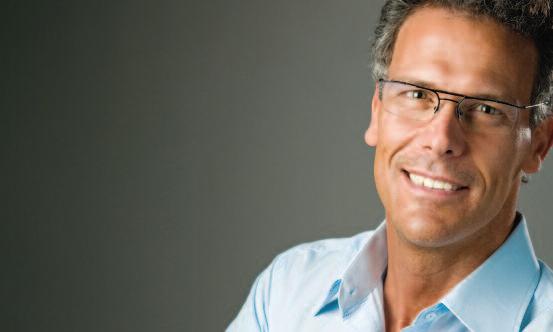


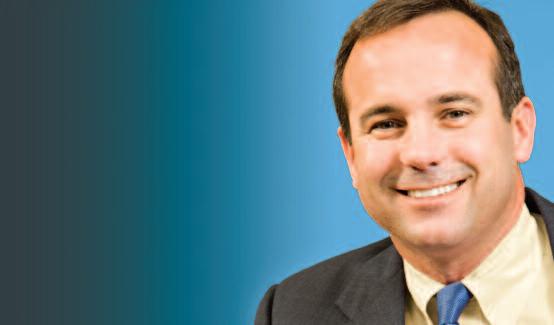
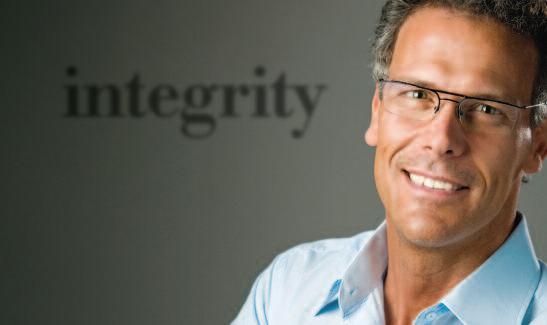

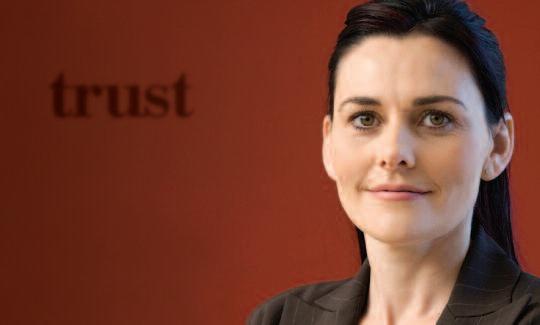
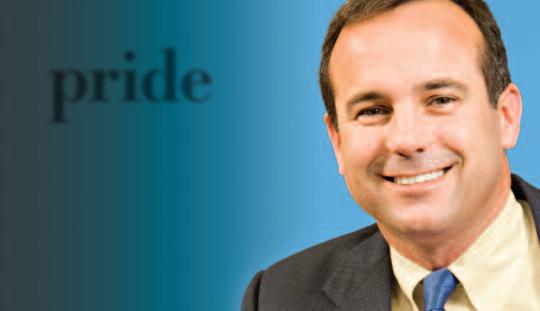

We asked ICPAS members to share their advice for this year ’ s up -and- comers Here’s what they had to say
“Start at the bottom to build a solid foundation, but climb the ladder(s) available while the stairs are being built ” James L Galvin
“To get your foot in the door be willing to learn new things, think outside the box and offer your services on any type of project you never know where it will lead you in your career ” Amy M Ott, CPA , Greater Rockford Airport Authority

“Being a good CPA doesn’t just mean that you have strong technical skills; having strong people skills in today ’ s environment is a must ” Michael G Wall, Kessler Orlean Silver & Co , PC
“ Your education is only just beginning. Like any other profession, to practice accounting means a commitment to keeping current with the law and regulaions it ’ s a great ride ” Robert Schroeder, Robert E Schroeder PA

“Ethical behavior is doing the right thing when nobody ’ s watching ” Mark A . Peterson, Robinwood Consulting LLC
“Choose a career that will give you exposure to all aspects of accounting Careers in public accounting, industry, or seeking a rotational program are all good choices ” Shantel Winder, FreedomRoads, LLC
“[E]ach day challenge yourself to learn something new to continue to build your individual skill set ” And “ never sacrifice your integrity Your personal integrity is one of your most important assets ” Jerome A Harris, CPA , The Harris Consulting Group
“Don't be afraid to fail and don't be afraid to stand out in a crowd ” Jerome P Frett, CPA
“Gain as much exposure as possible to the broader business disciplines finance, marketing, management, business technology….The skill set that will serve you best needs to expand beyond pure accounting.” Richard T. Pawelko, CFA , CPA , CMA , JMG Financial Group, Ltd
“Don’t fear failure” but “learn from every mistake ” Tom Curatolo, Hometown America


11 percent
Percent of time US users spend social networking while online.
Source: ResearchShelf com
Despite reports that the end of the recession is near, 86 percent of US adult workers feel the economy is still in crisis, according to a Workplace Insights Survey from Adecco Group North America [Adeccousa com] In addition, 78 percent of workers believe this is the worst job market they ’ ve ever seen in their careers Nevertheless, workers of all ages are starting to think about (or have already started to explore) new job opportunities, indicating that a “ war for talent ” has begun and that employers should brace for workforce changes in the year ahead According to the survey, the percentage of Gen Y workers looking for a new job in 2010 has grown from 14 to 30 percent, and 51 percent of workers plan to go or already have gone on a job interview Furthermore, 30 percent of Gen X workers, 29 percent of Baby Boomers and 22 percent of workers aged 61 and over also have interviewed or plan to interview in the year ahead
Bloomberg New Energy Finance’s [newenergyfinance com] quarterly figures show that new financial investment in clean energy worldwide totaled $27 3 billion in the first quarter of 2010, up sharply from $20 8 billion in the same period last year The latest data shows that two of the strongest features of investment in Q1 were, once again, China and wind farms Investment in clean energy assets in China in the first quarter totaled $6 5 billion, the largest for any country, while investment in wind farms worldwide was $14 1 billion, increasing a respective 24 and 43 percent over Q1 2009 figures
An overwhelming majority of senior financial executives say their tax department ’ s top priority is not tax savings or their effective rate, but timely and accurate return and financial reporting, according to a national survey of CFOs and senior comptrollers conducted by Grant Thornton LLP [GrantThornton com/cfosurvey] Specifically, nearly twothirds (62 percent) said their top priority is either timely and accurate financial reporting or timely and accurate tax return preparation and compliance Another 10 percent listed accurate tax risk assessment and appropriate management as the top priority Just 12 percent ranked overall effective tax rate as the top priority, and just 16 percent said their top priority was actual tax savings or deferrals
Both Congress and the IRS have recently taken far-reaching steps to beef up compliance tools for what they see as too much aggressive tax planning The IRS is currently developing a tax return schedule that will force large corporations to list and disclose detailed information on any tax position that meets the IRS definition of “uncertain.” And Congress just passed legislation that changes the rules and dramatically increases penalties for transactions that “lack economic substance ”
The Illinois CPA Society has been selected as a multiple winner in Graphic Design USA’s 2010 American In-House Design Awards Competition Of 4,000 entries submitted from across the country, the Illinois CPA Society received Certificate of Excellence Awards for both its Young Professionals Group Student Membership “Real World” Application and its Legislators Tax Guide 2009-10 (pictured above)

The CPA Exam is scheduled for ground-breaking changes designed to make CPAs evermore relevant in the global marketplace The revised test, which will take effect in January 2011, will include new Content and Skill Specification Outlines (CSOs/SSOs), and will introduce new question formats and a new release of authoritative literature the FASB Accounting Standards Codification Other changes include new section structures, research simulations, section time allocations and a weighted value for each component Scoring will place more emphasis on skills, and a new calculator and improved spreadsheets also are being developed Test results will be delivered much faster, too 2 to 4 weeks rather than 8 to 10 weeks after taking the exam Another significant change is the addition of IFRS, following research that revealed the need for an increasing number of entry-level CPAs to be familiar with the international financial reporting standards IFRS questions will be a small portion of the exam to start, but will expand over time
The AICPA and NASBA also hope to offer the CPA Exam internationally on a pilot basis in a few countries in 2011 International candidates will continue to apply through state boards and will have to complete the full process for attaining the CPA license
Looking for the most intuitive, cost-effective and complete XBRL solution? WebFilings takes the mystery and complication out of XBRL mapping, tagging and reporting. Unlike “bolt-on” post-process solutions, our end-to-end SEC report management software enables accountants — not XML programmers — to tag SEC reports as they draft them. WebFilings is a revolution in regulatory compliance software, delivering the only complete, integrated solution to meet SEC reporting requirements.




Integrated, easy-to use XBRL tools and instant EDGAR conversion eliminate timeconsuming and costly internal and external processes.
Sophisticated data linking, document review and validation capabilities improve accuracy, transparency and compliance.

Our intuitive “one active document” collaboration tools simplify the entire reporting process from drafting through filing.
Moves to make the IRS exam process crystal clear
H
is an Ernst & Young retired partner who currently consults on substantive technical and professional standards issues An ICPAS member since 1986, he has also appeared as an expert witness on several cases
Commissioner Doug Shulman’s remarks before the April mid-year meeting of the Tax Executives Institute (TEI) shed some light on the IRS’ “evolving approach to the examination process.” In my last column, I described the January announcement relating to the IRS proposal for taxpayer disclosure of uncertain tax positions Apparently this disclosure is only one part of the new approach
Although the Commissioner indicated a change in that approach to “balanced tax administration with respect to our large taxpayers,” if Announcement 2010-9 (the Announcement) is any indication of the IRS definition of large taxpayers, far more companies than those represented at the TEI meeting will be affected. In fact, the Announcement would require disclosure for taxpayers whose assets exceed $10 million.
To refresh your memories, the Announcement proposed the inclusion of a separate schedule in the income tax returns of those business taxpayers that meet the criteria Each position for which a reserve has been established under FIN 48 (FASB Interpretation No 48, Accounting for Uncertainty in Income Taxes, an Interpretation of FASB Statement No. 109) or under other Generally Accepted Accounting Principles would be included in the schedule.
The schedule would need to describe the nature of the issue and include a statement of the reasons t h e p o s i t i o n i s u n c e r t a i n A m o n g o t h e r r e q u i r e d f a c t o r s , t h e s c h e d u l e w o u l d r e v e a l t h e I n t e r n a l Revenue Code section potentially impacted by the position and the maximum amount of potential federal tax liability attributable to each uncertain position.
Shulman contends that taxpayers and tax authorities are looking for a tax administration system that provides:
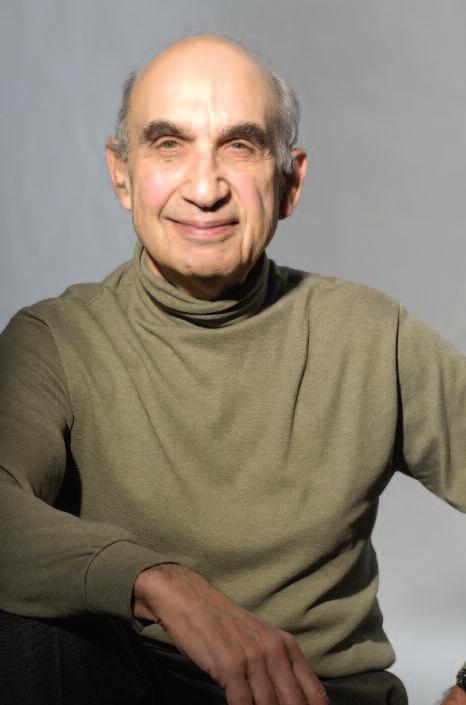
n Certainty regarding a taxpayer ’s tax obligations sooner rather than later;
n Consistency across taxpayers; and
n An efficient use of government and taxpayer resources by focusing on the issues and taxpayers that pose the greatest risk of tax noncompliance
Few would argue with his belief However, if the methods employed require the taxpayer to reveal the “uncertain (read that aggressive) tax positions” taken on a return, many taxpayers will likely believe this is too high a price to pay to attain those elements.
The Announcement requests comments in a number of specific areas, and the due date for those comments was extended from March 29 to June 1 in Announcement 2010-17. At an April hearing of the House Small Business Committee, Commissioner Shulman indicated that the IRS would consider raising the $10 million threshold and “would consider anything
a r v e y C o u s t a n , C PA
based on comments and how persuasive they are.”
At the TEI meeting, Shulman stated that t h e n e w a u d i t a p p r o a c h , i n c l u d i n g t h e r e q u i r e d d i s c l o s u r e s c h e d u l e a s a “ m a j o r s t e p , ” w o u l d i n v o l v e “ m o r e t r a n s p a r e n c y o n y o u r p a r t ” H e u s e d t h e C o m p l i a n c e Assurance Program (CAP) as a good examp l e o f t h e s u c c e s s o f a m o r e t r a n s p a r e n t process CAP’s goal is to put the taxpayer participant’s “cards on the table” and eliminate the need for examining IRS agents to spend time on searching for issues, instead a l l o w i n g t h e m m o r e t i m e t o a d d r e s s t h e substantive quality of positions reflected on the return.
Originally adopted as a pilot program in 2005 when 17 taxpayers participated, the program boasted 70 participants by 2008. The Commissioner has indicated that the IRS is in the process of making it permanent.

Although the IRS and perhaps participating taxpayers would praise the program’s benefits, I have talked to executives of a number of taxpayers who, in spite of some taxpayer benefits, would not participate in the CAP program, and are, in fact, very concerned about the Announcement and the transparency it features
At the TEI meeting, the Commissioner outlined the IRS’ need to focus on three critical areas to ensure the information received on the proposed disclosure schedules would be used efficiently and effectively His answer to eliminating uncertainty caused by ambiguous laws is to publish guidance as quickly as possible To make the audit approach more efficient, he will see that the IRS does not ask
for the same sort of information required under the present process.
S e l e c t i n g t h e r i g h t i s s u e s o n w h i c h t o spend time will be a step in that process He will also modify the tiered issue process so that resolutions are determined quickly b y f i x i n g r e s p o n s i b i l i t y w i t h i n t h e I R S t o most effectively use the information received in a more transparent environment The third critical area is the training of agents to properly use the information on the disclosure schedules
The Commissioner also addressed some concerns he had heard about the proposal, specifically,
n The list of disclosed uncertain positions is not intended to result in deficiencies assessed for every position
n The requirement for disclosure of each position’s maximum adjustment is intended to help the IRS to prioritize i s s u e s within an audit, identify returns for audit and pinpoint emerging issues of potential concern The IRS, according to Shulman, w a n t s t o h o n o r i t s p o l i c y o f r e s t r a i n t i n obtaining information traditionally cont a i n e d i n t a x a c c r u a l w o r k p a p e r s , a n d t h e r e f o r e d i d n o t p r o p o s e t h a t t h e t a xpayer disclose the risk-adjusted amount for each issue (as is required under FIN 48 for financial statement purposes).
n T h e C o m m i s s i o n e r e n c o u r a g e d t a x p a ye r s t o c o m m e n t o n t h e r e d u n d a n c y o f information reported to the IRS, and he m e n t i o n e d t h e o v e r l a p o f t h e p r o p o s e d s c h - e d u l e a n d s c h e d u l e M - 3 H e i n d icated that he felt the new schedule had t h e p o t e n t i a l t o b e a m u c h m o r e v a l uable tool for fair and effective tax admin-
istration, and welcomed input regarding M-3’s future filing requirements
Commissioner Shulman stated that the IRS is prepared to allow the new schedule to serve as adequate disclosure for certain areas that require substantial understatement penalty protection (Form 8275 or 8275R disclosure under current rules)
In late March, the IRS issued a draft schedule UTP, Uncertain Tax Positions Statement, along with instructions that reflect a number of points proposed in the Announcement
The draft instructions and IRS Announcement 2010-30 that accompanied them indicate that at the point when they were issued, only C corporations that file Form 1120, 1120L (filed by life insurance companies) and 1120F (filed by foreign companies) would require the UTP schedule for 2010 if they met the other criteria
The IRS stated that it would consider when other entities might be required to file UTP after it had received and considered comments I will follow the progress of this very important issue and report in future columns
Even though the Commissioner attempts to win the acceptance of taxpayers who will be affected by the proposed disclosure requirements, his prepared remarks include a statement that he understands “that it is a ‘game-changer ’ with respect to (IRS) relationships with and responsibility to…large corporate taxpayers ” This may be an understatement and does not address the tension that might be created between taxpayers and their outside income tax return preparers who, in many situations, also audit their clients’ financial statements.
Are you forensic accountant material?
First, the good news at least from a career perspective: Fraud is back in today’s headlines Lehman Brothers and Goldman Sachs coverage is dominating business publications and has crossed over into mainstream media, driving Fraud’s Q rating back up to levels last seen in Sarbanes-Oxley days. Corporate greed and complex accounting transactions are more than topical; they’ve caused real concern among business owners, managers and stakeholders These concerns translate into a real need for more qualified, competent and experienced forensic accountants
So how do you get started?
Though accomplished forensic accountants herald from a variety of backgrounds, they do share common traits First and foremost, forensic accounting is an accounting function An understanding of accounting principles, concepts and systems, and of accounting’s role within an entity, is therefore vital
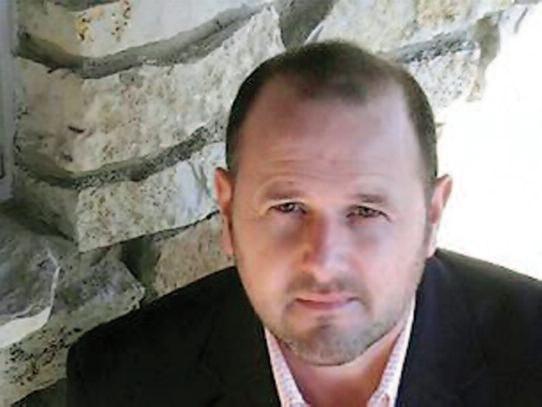
is the managing member of The Sargent Consulting Group, LLC, which specializes in forensic accounting and financial investigations. Brad is a frequent lecturer on forensics and fraud, and is chair emeritus of the American Board of Forensic Accounting. He also serves on the Board of Directors of the Illinois CPA Society, and has been a member of the Society since 2002
At the entry level, an accounting educ a t i o n i s t h e f i r s t s t e p i n g a i n i n g t h e s e insights. Work experience in accounting, beginning with an internship, provides a b a c k g r o u n d i n a c c o u n t i n g s y s t e m s , source documents and the accountant’s function. It’s important to note that many m a j o r f r a u d c a s e s h a v e b e e n b r o k e n b a s e d o n t h e o b s e r v a t i o n s a n d s u b s equent disclosure of young accountants w i t h n o m o r e t h a n t w o o r t h r e e y e a r s experience. They had enough education a n d t r a i n i n g t o r e c o g n i z e p r o b l e m a t i c accounting when they saw it Forensic a c c o u n t i n g ’s c l o s e l y g u a r d e d s e c r e t i s that most accounting frauds don’t rise above an intermediate accounting textbook level in terms of sophistication
B u t t h a t ’s n o t t o s a y t h e b a s i c s a r e e n o u g h F o r e n s i c accounting involves the detailed examination of data, typically accounting and business records such as accounting system output, bank documents, shipping/receiving records and financial statements Given this, there are three musthave traits that successful forensic accountants possess: bigpicture vision (or, to put it another way, the ability to connect the dots), attention to detail and tenacity.
The best way to illustrate the big-picture mindset is to give some examples Take, for instance, a staff accountant who looks over an employee expense report for travel but travel never occurred Or the bank teller who recognizes an employee is cashing a business check for amounts far in excess of a payroll or expense reimbursement. Or an auditor who observes an accounting entry posted to an account two months after the period close In all these cases, the people involved saw beyond the numbers to find fraud
With the sheer volume of data and document review that goes into a forensic accounting engagement, a person who penetrates the details to see patterns or anomalies truly stands out. Huge frauds have been perpetrated by those with internal knowledge of materiality thresholds and the smarts to keep transactions under the auditors’ radar In forensic accounting, unexplained and irreconcilable accounting, regardless of the amount, merits review. Clever fraudsters will get bogus transactions close to reconciling with legitimate entries, taking the educated guess that auditors will pass and move on They also are aware that certain intentional defalcation might be viewed as innocuous typos or human error The ability to distinguish between John Smith, Inc. and John Smith, LLP can be critical in an investigation Bank account numbers that look identical at a glance may, in fact, be two separate accounts with very different balances. In forensics, the devil truly is in the details
Tenacity, however, may be the most important trait. You’ve connected the dots and identified some seemingly minor discrepancies, but what if the CFO or CEO or your supervisor insists you’ve got it wrong? It takes tenacity to cling to your beliefs
At the conclusion of every forensic project comes a report of your findings and results. This is no longer entry-level or intermediate work; now we’re talking about expertise
Forensic accountants must be able to communicate effectively, whether talking over the phone or preparing an expert report to be submitted to a court. Verbal testimony should be short and to the point and understandable to the layman The ability to communicate findings in a succinct, cogent manner is critical.
After communication, credibility is the most important factor in deciding who to hire as an expert forensic accountant Steven A Weiss, chairman of Schopf & Weiss LLP, a firm specializing in business litigation, states that, “In hiring a forensic accountant, I look for two things. First, the accountant has to have a firm grasp of the technical side of his or her job I have to have confidence that he or she will understand the issues and be able to find what I am looking for. Second, he or she has to be a good witness Finding the key evidence is only half the battle. They also have to be able to explain it to a judge or jury, and do so in a compelling and credible manner ”
A background in the specific industry that relates to the investigation is a definite plus in establishing credibility In an automotive case, for example, the forensic accountant who previously worked auditing automotive concerns would almost always be viewed as more knowledgeable than the forensic accountant without that industry experience.
Michael J Berger, senior partner at Berger Schatz, which specializes in matrimonial and family law, explains that, “I look for a forensic accountant who has knowledge in the industry in which the subject business is operating. In addition to tying out numbers, I expect the expert to identify missing pieces that should be included in the business model, and to identify pieces of the business that are included, but appear to be out of line That accountant is there to help, to be free-thinking, not just doing the math ”
Credentials also are key. The CPA designation is universally recognized by judges and jurists as the premier credential in accounting. Additional credentials in areas such as fraud investigation, business valuation or insurance coverage add to an expert’s credibility
If you’re still interested in being a forensic accountant, you may need to step back on the career ladder to get on a new path with more relevance to the forensics field. If you have the right stuff and develop a passion for forensic accounting and its intrinsic rewards, however, you will have a great career
1 BasedonAlliant’snewandusedautoloanratesasof05/21/2010vs.Illinoisbankaveragenewandused48monthauto loanratesasof05/21/2010. 2 Alliantvehicleratesasof05/21/2010.Loanapproval,APRanddownpaymentrequired basedonpaymentmethod,creditworthiness,collateralandabilitytorepay.Ratesincludeautomaticpaymentoption. Ratesare0.4%higherwithoutautomaticpaymentoption.Rates,termsand conditionsaresubjecttochange.Add1%for84monthterm.APR=Annual PercentageRate.RefinancingofexistingAlliantloansandloansfromother lendersisavailable.PleaseaskanAlliantLoanRepresentativefordetails.
3 Source:IllinoisbankaverageratesprovidedbyNationalAssociationof FederalCreditUnionsincooperationwithDatatracCorp.asof05/21/2010.
4 YoumustbeorbecomeamemberofAlliantCreditUniontoapply.Applicant mustmeeteligibilityrequirementsforAlliantmembership. 5 Termsupto 60monthsforloanamountslessthan$20,000.Termsupto72monthsfor 2009or2010modelswithaloanamountof$20,000ormore.Termsupto 84monthsonnewvehicleloansof$25,000ormore.

is a principal in the financial advisory firm of Reason Financial Advisors, Inc
His 25+ years of finance and accounting experience includes 13 years in personal financial planning An ICPAS member since 1982, Mark currently serves in the Society ’ s IA/PFP Member Forum Group and on its Committee on Structure and Volunteerism
Clients entering retirement, or seriously planning for it in the near future, are likely to view the investment world more apprehensively than they ever have in the past.
One reason: The financial crisis and recession have cast a skeptical shadow on Wall Street, the financial markets and investing in general Investor confidence in the continued growth of the global economy, and in the rewards of investing, has been shaken to a greater e x t e n t t h a n i n t h e a f t e r m a t h o f t h e 9 / 11 a t t a c k s , t h e 2000 tech bubble and the 1987 market crash. Many of t o d a y ’s r e t i r e e s a n d p r e - r e t i r e e s l i v e d t h r o u g h t h o s e e v e n t s a n d g e n e r a l l y s a w t h e i r p o r t f o l i o s s t u m b l e , s o m e t i m e s s i g n i f i c a n t l y, b u t e v e n t u a l l y c o m e b a c k fairly strong
And while it’s true that equity markets have posted strong returns recently (through March 31 of this year, the S&P 500, Russell 2000 and NASDAQ Composite 12-month returns were 49 8 percent, 62 8 percent and 58 3 percent, respectively) rising US debt levels and high unemployment rates have contributed to a generally dubious view of the economy.
But even if the crisis had not taken place, many of t h e s e c l i e n t s w o u l d n a t u r a l l y t e n d t o f a v o r a l e s s a g g r e s s i v e a l l o c a t i o n f o r t h e i r i n v e s t m e n t p o r t f o l i o s I n s t e a d o f a p p r e c i a t i o n , w h i c h m a n y s o u g h t w h i l e making semi-monthly contributions to 401(k) plans or annual contributions to IRAs, some clients will conclude that the income (interest and dividends particularly) that an investment portfolio will generate is most important That’s because interest and dividend paym e n t s a r e r e l a t i v e l y p r e d i c t a b l e a n d m o s t l y s t a b l e , even if underlying asset values fluctuate widely.
P r e d i c t a b i l i t y i n c a s h f l o w s e x t e n d s e l s e w h e r e i n retirement For instance, retiring clients can reasonably estimate the amount of their recurring living expenses, a n d c a n a l s o p l a n f o r i n c o m e s o u rc e s l i k e p e n s i o n s (sometimes) and Social Security When those income sources fall short of living expenses, though, clients look to their investment portfolios to generate sufficient income to make up the shortfall These investors also may want to generate a surplus of cash flow in case expenses are greater than they expect. And, understandably, they’d like their investments to provide as much income as possible
As CPAs and advisors, we know the dilemma in situations like this In order to produce higher income or yield from a given amount of investments, the investor has to be willing to take on more risk, which often runs counter to the more conservative risk tolerance profile that these clients exhibit So the challenge of balancing the desire for higher-yielding investment assets with the tolerance for investment risk becomes especially critical
As I am writing, the Federal Reserve’s target Fed funds rate is 0 – 0 25 percent, which is historically low. It means that market interest rates are also historically low, and therefore bor-
rowers like corporations, mortgage holders and credit card customers have benefitted But savers have suffered According to Bankrate, the average bank money market account is paying just 0.88 percent interest, while the average 1-year bank CD is paying 1.34 percent interest. A client would have to place a deposit in a 5year bank CD simply to generate an average return of 2.86 percent.
In the present economic environment, it’s hard for a conservative investor to either generate an acceptable level of income or grow a portfolio net of taxes and inflation. Up until now, inflation f o r t u n a t e l y h a s b e e n f a i r l y w e l l - c o n t a i n e d , a t a y e a r- o v e r- y e a r increase in the CPI of 2 3 percent through March 31, 2010 However, a number of clients are concerned that any significant pickup in economic growth and/or reduction in unemployment could trigger serious inflation, absent of preemptive action by the Fed
In order to generate higher income than bank products, investors m a y w e l l l o o k t o f i x e d i n c o m e m u t u a l f u n d s I n d o i n g s o , i t ’s important to consider all the statistics, including recent average credit quality ratings, average durations, average maturity and 12month yields For example, the average yield in the High Yield Bond category is relatively attractive at 7 65 percent However, its credit quality is rated B, which is considered “highly speculative,” and therefore well below the prized-AAA rating Most likely, this would be unacceptable to conservative investors because of the risk of principal loss.
On the other hand, AAA-rated categories such as Intermediate Government, Short Government and Inflation-Protected Bonds have average yields of 3.36 percent, 2.34 percent and 1.83 percent, respectively, which may not be high enough for income-hungry investors Even the AAA-rated Intermediate Government category may be unacceptable to some investors because of its average maturity in excess of 5 years If interest rates rise, longer maturity bonds will fall in value more than shorter-maturity bonds This is confirmed by the average duration of 3 98 for Intermediate Government funds, which roughly means that for every 1-percent increase in interest rates, the average value of the bonds would be expected to fall 3 98 percent In an environment where interest rates are expected to increase, that may be more risk than a conservative investor is willing to take on
Those income-oriented investors willing to take on more investment risk than can be found in cash and quality bond investments may be interested in preferred stocks, dividend-paying stocks, or real estate investment trust stocks and funds At May 28 market close, these exchange-traded funds provided yields of 7 98 percent (ticker symbol PFF, which tracks the S&P US Preferred Stock Index), 3 9 0 p e rc e n t ( t i c k e r s y m b o l D V Y, w h i c h t r a c k s t h e D o w J o n e s Select Dividend Index) and 4 01 percent (ticker symbol IYR, which tracks the Dow Jones US Real Estate Index)
Today’s investors may have to be willing to accept higher levels of investment risk in order to earn the higher amounts of income they need. It becomes especially critical in low-interest times like these to understand the client’s financial objectives and to help t h e m a p p r e c i a t e t h e c o s t o f i n v e s t i n g i n h i g h e r- y i e l d i n g a s s e t s . Some clients will likely decide this risk is unacceptable, and will b e g r u d g i n g l y a c c e p t l o w - y i e l d i n g a s s e t s i n t h e i r p o r t f o l i o s . O f course, over time the economy will change, and interest rates with it, which means decisions will have to be reviewed
17th Annual Midwest Symposium

Accounting and Financial Reporting

Updates from the SEC, FASB, IASB and PCAOB
An all-star line up of the “who’s who” in financial reporting – all in one information-packed day.
A comprehensive overview of the latest developments and projects impacting your business and/or clients.
A unique opportunity to interact with the panelists to pinpoint your specific concerns.
September 24, 2010
Donald E. Stephens Convention Center, Rosemont, Illinois
$330 members / $400 non-members
8 CPE Credits (7 CLE Credits Pending)

The early bird catches the worm, as they say And it’s no secret that accounting professionals striving to stay relevant will take the initiative to arm themselves with IFRS knowledge and a global mindset sooner rather than later
Who better to teach professionals the inner workings of IFRS than markets and economies that have worked under these guidelines for years? Industry professionals suggest that one of the best moves accounting professionals can make is to take an overseas assignment and learn the standards firsthand.
“The key here is deep knowledge. It’s knowledge of the differences between IFRS and US GAAP that matter,” says Belverd E. Needles, Ph.D., CPA, an Ernst and Young Distinguished Professor of Accounting at DePaul University, former chair of the Illinois CPA Society and a recent appointee to the United Nations Conference on Trade and Development Consultative Group to the

Reporting “International experience cannot hurt anyone People who have worked in Europe for f
Standards on Accounting
n t h e United States ”
Industry experts agree, however, that it’s more than a sense of urgency over IFRS that’s inspiring interest in overseas engagements It’s also about the global movement of business and a shift across US companies to a more global perspective.
According to Steven Lewis, division director for the Chicago office of Robert Half Finance & Accounti n g , t h e f o r m u l a i s v e r y s i m p l e c o m p an i e s w a n t t o h i r e p r o f e s s i o n a l s w i t h a broad-based understanding of world cultures, and professionals who want the best jobs need to have these skills to land on the cutting edge
“You don’t want to have too many people thinking the same way You need different cultural viewpoints,” Lewis explains “International experience certainly can’t hurt ”
AWB is an online recruitment agency for auditors, accountants and other finance pros interested in working internationally International Careers and Jobs
Consider current initiatives underway at Grant Thornton Named as executive director of Global HR Strategy three years ago, Laurie Kalman is part of a strategic effort to develop and integrate the firm’s employees, encompassing 99 member firms and 30,000 people. Kalman explains that as the firm examined its strategic roadmap for the fut-
the stress on global leadership became evermore obvious
“ We a r e r a p i d l y s h i f t i n g f r o m a n e tw o r k o f a u t o n o m o u s f i r m s i n t o a m o r e cohesive global organization,” she says. “ G r a n t T h o r n t o n i s u n d e rg o i n g a l a rg es c a l e t r a n s f o r m a t i o n t o b e c o m e a c l e a r employer of choice.”
As part of that strategy, the firm is looking for talent that has both relevant technical skills and cultural diversity. “We are l o o k i n g f o r p e o p l e w h o h a v e a g l o b a l mindset and can lend a global perspective,” she emphasizes. “We need people who are not just technically excellent but culturally sensitive. As professionals service global clients, they need to be able to reach beyond borders.”
The first step for accounting professionals, says Needles, is to look for assignments in locations that already have a strong IFRS footprint. Currently, in fact, more than 100 countries across the globe have IFRS in play, and many others are heading in that direction.
“Clearly, the major economies are going that way,” Needles notes, pointing to newcomers like Canada and Brazil. “Globally, there is a real need in this area.”
Europe and Australia are good starting points for solid IFRS experience, since both have had IFRS in place since 2005, Needles adds. Remember, too, that English is spoken across both locations.
“If a young person were able to get an assignment in Europe or Australia for four to six years, it would be a very valuable thing,” Needles explain. Individuals with overseas experience, he says, often find t h e y h a v e a n a d v a n t a g e o v e r t h e i r i nc o u n t r y c o u n t e r p a r t s b e c a u s e t h e y a r e equipped with global experience, possess s u b s t a n t i a l c o m p a n y k n o w l e d g e a n d have the skills to advance new projects.
The 2009-10 Robert Half Global Financial Employment Monitor reports a number of key findings regarding talent demand globally. Overall, the survey of 4,800 accounting and finance professionals in 21 countries found that 56 percent of respondents were facing difficulty in finding skilled talent. The report concluded that hiring challenges remain especially acute in Asia, as 86 percent of managers in Hong Kong, 73 percent in Japan and 72 percent in Singapore cited difficulty filling accounting and finance positions.
Demand in Europe varied widely as 40 percent of managers in Ireland expressed difficulty, while 65 percent in Spain, Italy
n d F r a n c e
Res-pondents from Brazil also reported the most challenges hiring financial management and financial and business analysis professionals.
Since globalization goes both ways, international companies planning to expand in the United States also will be seeking out firms and professionals who have a keen understanding of IFRS. As Lewis explains, “European companies with US subsidiaries previously couldn’t find talent to match needed skill sets. Going forward, it will mean expanded opportunities for US accountants because they will have a skill set that is in demand.”
B e y o n d t h e t e c h n i c a l s k i l l s o f I F R S , K a l m a n s t r e s s e s t h a t t h e “ b a r h a s b e e n raised in accounting” and, going forward, professionals will need to be able to collaborate on a high level internationally.
Grant Thornton has implemented steps to meet the challenge. “We actually have gotten very proactive in this,” says Kalman. “We’ve implemented world-wide training for all managers. This is rigorous training on what it means to be a global leader and be strategic.”
I n i t s s e a rc h f o r a c c o u n t a n t s , G r a n t
T h o r n t o n t a rg e t s f o u r k e y t r a i t s : S t r o n g business acumen; a global mindset that is f l e x i b l e a n d a d a p t a b l e t o d i f f e r e n t c u ltural environments; a genuine interest in h e l p i n g c l i e n t s a c h i e v e s u c c e s s i n a global landscape; and an understanding of what operational excellence means.
To b r o a d e n t h e i r g l o b a l p e r s p e c t i v e s , Lewis advises accountants to gain a widea n g l e v i e w o f i n d u s t r i e s . O f f e r i n g a n example, he suggests looking at the differences between highly regulated compan i e s l i k e a i r l i n e s a n d b i g i n f r a s t r u c t u r e i n d u s t r i e s l i k e r e n e w a b l e e n e rg y, a n d then seeing how those differences line up with career preferences.
“Taking a big picture look at these areas is becoming very important,” he states.
“Manufacturing is great, but ask, ‘What is a company manufacturing?’ You’ve got to be thinking where the underlying demand is coming from and how governments support those industries.”

Finance gurus play a key role in bringing criminals to justice
By Derrick LillyIf you’ve ever dreamed of being a crime-fighter, busting bad guys and saving the day, you’re in luck An education in accounting and the CPA certification, amongst others, can open doors to far more than your typical accounting and auditing gig In fact, our Federal government’s law enforcement and intelligence agencies are looking for people just like you
“What law enforcement has come to realize is that there are two sides of the criminal investigation There is the traditional criminal side where the pursuit of the targets takes place and evidence of the violation is sought, and on the flipside there is the fact that individuals get into criminal lifestyles for financial gain and benefit,” says Todd H Reichert, supervisory special agent in the Bureau of Alcohol, Tobacco, Firearms and Explosives (ATF) Chicago Field Division “The facts of the matter are, if we only focus on the principal targets and forego their benefits and profits from engaging in criminal activities, we’re only doing half the job in keeping the streets safe, because there would still be an array of assets to fund the continuation of a criminal organization,” he explains.

Here, then, are just four of the many government agencies offering CPAs opportunities to serve and protect. For more agencies, visit USAjobs.gov.
To shut down criminal and terrorist activities, the ATF enlists an elite group of highly trained forensic investigative accountants and auditors in its Financial Invest i g a t i v e S e r v i c e s D i v i s i o n T h e s e p r o f e s s i o n a l s t a k e t o t h e f i e l d a l o n g s i d e t h e Bureau’s special agents in criminal investigations
n ATF: “We love to find candidates that have already passed the CPA Exam We also look for CFE holders,” explains Frandé. “We encourage holding advanced certifications because they add to credibility in the courtroom and enhance the diverse skills you can bring to the table when investigating frauds and other financial crimes ” Visit ATF gov/careers for more
n FBI: “One of the most important traits the FBI considers is character,” says Rossbach. “At the end of the day, the value of an employee is their ability to testify in court We can train anyone, but you have to have solid, fundamental character to build upon ” Visit FBIjobs gov for more
“The ATF is the only agency in the Federal government right now that has a very unique use of forensic accountants and forensic auditors in terms of the responsibilities they have,” says Franco Frandé, c h i e f o f t h e AT F F i n a n c i a l I n v e s t i g a t i v e Services Division in the Office of Science and Technology, Washington, DC “We work every single case type for every single criminal investigation where ATF special agents feel there’s a financial motive or nexus Our forensic investigative acco u n t a n t s a n d a u d i t o r s w o r k i n p a r t n e rship with our special agents every step of the way to develop the financial aspects of the case ”
n DEA: “The main thing is to have a desire to have a job where you ’ re doing something different all of the time; you never know where a case may take you, ” says Taylor “ You also have to be able to work independently and within a group, and need the patience for these types of long-term investigations; looking at the financial aspects can take years. ” Visit Justice gov/dea/resources/job applicants html for more
n CIA: “A strong sense of patriotism, an interest in global affairs and the willingness to take on tough challenges are some of the key things we look for,” says Weiss “The CIA, which offers over 90 different occupations, seeks a broad range of skills and experiences from job candidates who are considering a career with America’s premier foreign intelligence agency ” Visit CIA gov/careers/index html for more
T h e AT F t a c k l e s a v a r i e t y o f c a s e s u n d e r i t s u n i q u e f r a m e w o r k t o p r o t e c t our communities from violent criminals, criminal organizations, outlaw motorcycle gangs, the illegal use and trafficking of firearms, the illegal use and storage of explosives, acts of arson and bombings, acts of terrorism, and the illegal diversion of alcohol and tobacco products. 8
Lifetime Achievement Awards
Edilberto C. Ortiz, CPA
Managing Partner, E. C. Ortiz & Co., LLP
Outstanding Leadership in Advancing Diversity Award
Dorri C. McWhorter, CPA, CIA
Partner, Crowe Horwath LLP

Marisol Pantoja, CPA
(Emerging Leader Category)
Internal Audit Director, PricewaterhouseCoopers LLP
Outstanding Educator Awards
Sara J. Leone, CPA
Assistant Professor of Accounting, University of St. Francis
Donald E. Tidrick, CPA, Ph.D.
Deloitte Professor of Accountancy, Northern Illinois University
Mary L. Zenner, CPA
Accounting Instructor & Department Chair, College of Lake County
Time & Talent Public Service Volunteerism Award
Martrice Caldwell, CPA
YMCA of Metropolitan Chicago
Robert E. Cameron, CPA
Cameron, Smith & Company, PC
Kathleen A. Donahue, CPA
Retired
David J. Hensley, CPA
David J. Hensley, CPA, Inc.
Chris Manderfield, CPA
Clifton Gunderson LLP
Clifford B. Shapiro, CPA
Blackman Kallick, LLP

James G. Quaid, CPA
Ostrow Reisin Berk & Abrams, Ltd.
The Illinois CPA Society is proud to recognize the following award winners and congratulate them on their accomplishments.

Jared J. Bourgeois, CPA
FTI Consulting, Inc.
Young Professionals Group
Timothy Cole, CPA
Baker Tilly Virchow Krause, LLP
Peer Review Report Acceptance Committee
Timothy C. Custis, CPA
Gorenz & Associates Ltd
Government Report Review
Barbara Dennison, CPA
Selden Fox, Ltd
Accounting Principles Committee
Rose S. Doherty, CPA
Legacy Professionals LLP

Not-for-Profit Organizations Committee
Burton W. Goode, CPA
Burton W. Goode, CPA
ICPAS Chapters
Edward J. Hannon, CPA, JD
Freeborn & Peters LLP
Tax Executive Committee
Gary S. Hart, CPA
Gary Hart & Associates Ltd.
Tax Estate, Gift & Trust Committee
Jon R. Hoffmeister, CPA
Clifton Gunderson LLP
Audit & Assurance Committee
David V. Kalet, CPA
BP America, Inc.
Tax Individual Income Committee
Irwin A. Lyons, CPA
Miller Cooper & Company
Government Executive Committee
Michael J. Maffei, CPA
GATX Corporation
Accounting Principles Committee
Ronald D. Marcuson, CPA
DePaul University
Tax Business Committee
Frank J. McCauley, CPA
State of Illinois
Chicago South Chapter
Richard S. Meyer, CPA
Alliant Group
Tax Business Committee
Peggy Tomisek Nästi, CPA
Peggy Tomisek Nästi, CPA
Fox Valley Chapter
Beth J. Pagnotta, CPA
Women’s Executive Committee
Mary Lou Pier, CPA
Pier & Associates
Tax Executive Committee
Michael J. Pierce, CPA
McGladrey & Pullen LLP
Audit & Assurance Service Committee
Daniel F. Rahill, CPA, JD
KPMG LLP
Tax Business Committee
Deborah K. Rood, CPA
Blackman Kallick LLP
Tax State & Local Committee
Michael J. Singer, CPA
Michael J. Singer & Co. PC
Tax Executive Committee
Larry J. Wolfe, CPA
Larry J. Wolfe CPA’s Ltd
Tax Practice & Procedures Committee
Mark J. Gilbert, CPA/PFS, MBA
Reason Financial Advisors, Inc.
Linda H. Forman, CPA
Linda Forman, CPA, PC
Geoffrey J. Harlow, CPA, MST, MBA
Kessler, Orlean, Silver & Co.
Enrique Lopez, CPA
Lopez & Company
Mary Lou Pier, CPA
Pier & Associates
Maria D. Prado, CPA
Prado & Renteria
Considering the fact that the bulk of these activities have financial motives behind them, ATF forensic investigative accountants and auditors are trained to be valuable field operatives, as well.
“At the special agent’s request we are geared and trained to know where to go, how to go and what to do during operations Whether we’re carrying out search warrants, writing subpoenas, reviewing documentation or conducting interviews, we are the special agent’s support,” Frandé explains “We are with them step-and-toe every part of the way. We train our forensic auditors and accountants not only to have a vast and diverse skill set in accounting and auditing, but also to have a criminal investigative skill set in order to bring our expertise to the criminal investigation.”
A b a c k g r o u n d i n a c c o u n t i n g , a u d i t i n g , b u s i n e s s , e c o n o m i c s , financial analysis and forensics are requirements for entry into various FBI special agent programs And professionals with advanced skills or credentials, like the CPA, CFA, CFE or CIA are a priority in the recruiting process.
“The FBI is a leader in law enforcement, and widely viewed as b e i n g t h e b e s t o f t h e b e s t I f y o u h a v e a g o a l t o w o r k i n l a w enforcement, you want to work for the FBI,” says Special Agent Edgar A Rossbach Jr , CPA, CFE, JD, MBA, who is assigned to an economic crimes squad in the FBI Chicago Field Office
A s a s p e c i a l a g e n t i n t h i s s q u a d , R o s s b a c h ’s r e s p o n s i b i l i t i e s i n c l u d e c o n d u c t i n g i n v e s t i g a t i o n s a n d t a rg e t i n g i n c i d e n c e s o f wrongdoing such as securities, corporate and commodities fraud,
and Ponzi schemes, in order to “protect and preserve the integrity of our financial markets ”
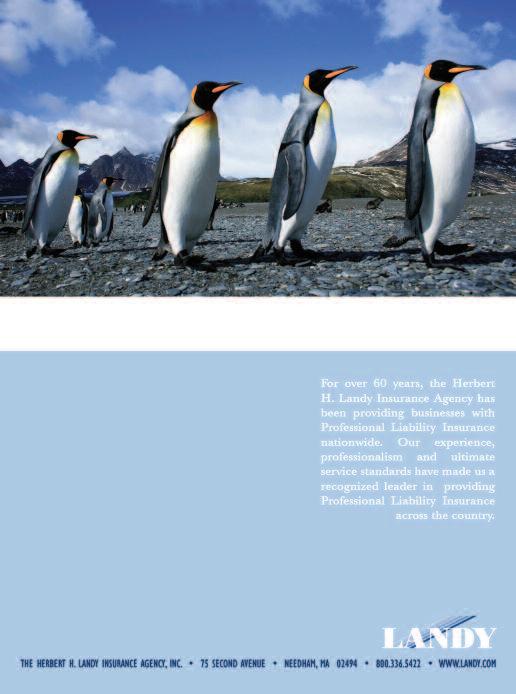
“CPAs are on all squads of all violations,” explains Rossbach “Every facet of crime whether it’s terrorism, counter-intelligence, or criminal matters has a money component at its core ”
Special agents work on cases that may involve terrorism, foreign counter-intelligence, cyber crime, organized crime, gangs, whitecollar crime, public corruption, civil rights violations, financial c r i m e , b r i b e r y, b a n k r o b b e r y, e x t o r t i o n , k i d n a p p i n g , a i r p i r a c y, interstate criminal activity, fugitive and drug-trafficking matters, and other crimes that constitute violations of Federal statutes.
Outside of field service there are critical support roles. “A lot of people think that you have to be an agent and carry a gun to work for the FBI However, there are opportunities available if you don’t desire to be a special agent,” says Latisha A Stokes, CPA, CFE, senior forensic accountant in the FBI Chicago Field Office “It’s probably not widely known that forensic accountants assist in investigations at the FBI without carrying a gun, but forensic accountants support the investigation and address any financial aspects of the case ”
Considering the fact that money is linked in some way to every case the FBI handles, forensic accountants “work the entire gamut; you aren’t focused on one particular area,” says Stokes “You can be assigned to a white-collar case as well as a counter-terrorism or counter-intelligence case.”
“Knowing at the end of the day that you have assisted in putting away criminals and helping to keep the country safe is an added bonus to having this job,” says Stokes


A bachelor ’s degree in accounting, finance or economics will put you on the DEA’s recruiting radar Applicants with finance expertise are on their special agent wish-list because such skills are highly utilized in accomplishing the DEA’s mission to dismantle the most sophisticated illicit drug trafficking organizations in the world.
“We have a special recruitment emphasis on individuals with these types of degrees because we need agents who have financial backgrounds and training involved in our investigations,” explains Will N Taylor, special agent in the DEA Chicago Field Division “There’s a large amount of money to be seized and forfeited in drug trafficking ”
Putting it in perspective, in Fiscal Year 2007 (the most recent p u b l i c l y r e l e a s e d i n f o r m a t i o n ) t h e D E A d e n i e d d r u g t r a f f i c k e r s $3 5 billion in revenue through the seizure of money, property and drugs Touching closer to home, it’s estimated that $10 to $24 million a month in drug proceeds leave the greater Chicago area, which serves as a major consolidation point for US drug trafficking organizations.
“Most illegal drugs consumed in the United States don’t originate in the United States, so those proceeds need to make it out of the country to the sources of supply,” says Taylor. “We want to attack the financial infrastructure of the drug trafficking organizations.”
To do that the DEA has developed specialized Financial Investigation Teams (FIT) focused on destroying drug traffickers’ financial networks “We’ve established our FIT teams in all of our major offices, and we also have specialized financial teams in Columbia and Afghanistan,” explains Laurie A Schlag, head of the FIT team in the DEA Chicago Field Division The DEA has a network of 227
offices in the United States and 87 offices in 63 other countries
“Our FIT teams support the domestic and i n t e r n a t i o n a l d r u g t r a f f i c k i n g a n d m o n e y l a u n d e r i n g i n v e s t i g a t i o n s b y f o c u s i n g o n t h e f l o w o f d r u g p r o c e e d s , e s p e c i a l l y o n our priority targets,” she says “They prov i d e a s u p p o r t r o l e t o o t h e r g r o u p s w i t h their expertise, but they also carry out their own street investigations and sophisticated undercover and sting operations.”
The DEA also has its own internal finance departments, which offer professionals a career path into government finances in areas such as financial management, budgeting, financial controls, organizational management, acquisitions and procurement, internal audit and capital planning
As the premier US intelligence agency, the CIA has an expansive network of agents tracking and analyzing the infinite changes in political, social, economic, technological and military environments around the globe
“Accountants and other finance professionals play valuable roles throughout the CIA, including as finance officers, econom i s t s , a u d i t o r s a n d a n a l y s t s , ” s a y s P a u l a We i s s , m e d i a s p o k e s w o m a n f o r t h e C I A
The agency recruits finance professionals to actively assess both licit and illicit activi t i e s t h a t a f f e c t U S s e c u r i t y i n t e r e s t s . F o r example, economic analysts within the CIA are used to assess foreign economic polic i e s a n d f o r e i g n f i n a n c i a l i s s u e s t h a t c a n directly affect the security of our nation
S i m p l y p u t , “ We n e e d p e o p l e w i t h diverse financial and forensic skills to help u s u n d e r s t a n d t h e n a t i o n a l s e c u r i t y c h a llenges that involve money,” says Weiss
There’s a particular need for economic analysts with strong backgrounds in China, t h e M i d d l e E a s t a n d S o u t h A s i a , a n d f o r specialists in international banking systems, financial markets, transactions and instrum e n t s . E c o n o m i c a n a l y s t s a r e a c t i v e l y sought to assess illicit financial activities, i n c l u d i n g t e r r o r i s t n e t w o r k s a n d c r i m i n a l g r o u p s , f i n a n c i n g a n d p r o c u r e m e n t o f weapons of mass destruction, money laundering, and corruption among foreign governments and companies As a CIA officer your duties not only shape the face of your country’s security, but possibly that of the world as well









July
Practical
August 2 –Chicago
August 10 –Springfield
Employee Benefits Conference
August 5 –Springfield
August
 By Sheryl Nance -Nash
By Sheryl Nance -Nash
S“tarting your career in public accounting is an immediate launch pad into business,” says Paul Stahlin, vice chairman of the American Institute of Certified Public Accountants “I loved public accounting,” he says
Stahlin spent six years at Price Waterhouse & Co, the predecessor firm of PricewaterhouseCoopers, and is now regional president of Skylands Community Bank in Somerville, New Jersey “You cram two years of knowledge into one year of experience, because you go to many clients and soak up many business models,” he says of public accounting. “You see best practices and deal with senior people at your client’s offices. You’re the person recommending changes, showing them how they can make money. You get real experience that you can’t pay for ”
The diversity in public accounting is what sets it apart professionals have the opportunity to gain an understanding of so many aspects of accounting and finance And they gain exposure to the company’s decision-makers early on in their careers
What’s more, public accounting offers the opportunity to become a partner of the firm, says Toby Coffey, director of permanent services for Robert Half International in Chicago “Starting your career in public accounting is a great fundamental opportunity. New grads gain excellent e x p o s u r e t o a v a r i e t y o f c o m p a n i e s a n d i n d u s t r i e s . I t g i v e s accountants the opportunity to gain exposure to many different a r e a s a n d d e t e r m i n e w h e r e t h e i r s t r e n g t h s l i e a n d w h a t m o s t interests them ” All in all, public accounting provides an incomparable starting point for a high-achiever ’s career
Furthermore, says Roy Cohen, author of The Wall Street Professional’s Survival Guide, “You get a chance to cut your teeth on more challenging accounting issues in an environment where you’re surrounded by stimulating colleagues and experts There’s a sense of camaraderie.”
There’s also a very public aspect to public accounting, which is an essential component of a professional’s grooming for top-ofthe-ladder positions later on Essentially, you are the face of the firm, which means you have to put your best foot forward, always Public accounting firms will do their part to help you “Large firms provide a lot of professional development and training They want their employees to be on the cutting edge,” says Cohen
Then too, there’s the earning potential that a start in public accounting offers you “When you leave the public sector and go private, you will command a higher salary than someone who may have spent the same number of years in solely the private sector because of the breadth and depth of your experience. No doubt, working in public accounting enhances your compensation going forward,” says Stahlin
The Sarbanes-Oxley Act of 2002 turned out to be a big boon to public accountants (and to internal auditors) “It basically added an extra level of job security,” says Faizal Chaudhury, internal audit supervisor for manufacturer Stepan Company of Northfield, Ill “So everyone in our industry will be watching very closely to see if this Act is modified or repealed in the years to come The transition of US GAAP (Generally Accepted Account-
ing Principles) to IFRS (International Financial Reporting Standards) also promises to be a hot new area of growth for public accounting firms, he adds.
But for all its promise, many of the people who leave public accounting tend to do so in the two- to six-year period, says Coffey They choose to make the switch for various reasons “Most want more well-rounded experience or experience within a particular industry In addition, many individuals don’t see themselves becoming partners in the long run, so they would rather climb the ranks within the private sector,” Coffey explains.
What’s the appeal of the private sector? Private accounting gives professionals the opportunity to hone their craft in an area of business they enjoy Professionals in private accounting also t e n d t o a c h i e v e g r e a t e r w o r k - l i f e b a l a n c e t h a n t h e i r p u b l i c accounting counterparts, although public accounting firms are taking steps to address this issue as they compete for top performers, says Coffey.
“As much as I loved public accounting, when I was married and my first child came along, I missed a lot of the moments that matter My time wasn’t my own, so that lifestyle issue was part of the reason I decided to leave,” Stahlin admits. “It’s not that you don’t work hard in the private sector, it’s just that you have some control over your time ”
Work-life balance, it seems, is where the private sector has the advantage

What’s also different in the private sector is that the accountant has a single client, the company, versus many clients With one client you grow your roots and establish relationships. Projects tend to be more in-depth, lasting two years or so, compared to the public sector where the time spent on projects may be much shorter. For those who like to dig deep and stay there for a while, the private sector is ideal
Also, the career path is different; there can be mobility across a broader spectrum of roles The long-term benefit of a corporate position is the fact that it will give you exposure to different types of projects and opportunities, says Coffey
You don’t have to focus solely on finance, but if you do, you can drill down and make decisions that have far-ranging impact. “It’s very rewarding to see the fruits of your labor, which you see when you’re going to the same place every day,” says Stahlin
In the private sector you can move vertically into leadership, or laterally to learn new skills. Some people start in accounting but learn new functions like marketing, says Cohen Positions l i k e c o n t r o l l e r, C F O a n d C E O b e c o m e a p o s s i b i l i t y a s y o u broaden your scope.
Job stability is top of mind for most people these days “The public accounting area is a great place to be in when the economy is doing well However, the recent economic downturn (and the one in 2001), clearly demonstrated that you don’t want to be in that area during such times Usually layoffs are quicker and much deeper in public than in the private sector,” says Chaudhury
In the end though, what you want out of your career is what matters most “Do you want to work for a large firm, while you determine where you’d like to specialize? Is there a particular company you want to work for? What kind of hours are you willing to put in?” Coffey asks. “Each accountant needs to ask these types of questions to decide on the sector that’s best for them ”
 By Christine Bockelman
By Christine Bockelman
The down economy has an upside opportunities for smaller accounting firms to attract top college talent are on the rise. With larger employers not hiring quite as much, students are taking a more serious look at their small- and mid-sized firm options
That translates to the need for a strong campus recruiting strategy a hiring route that many smaller firms may not have considered in the past due largely to the competition
“On-campus recruiting has declined a lot for people so there are more opportunities for smaller firms to get a foothold or make a presence,” says Michael Shapow, VP of Robert Half International “Because of the decline, schools are doing more outreach to employers and giving small regional CPA firms a bigger stage than in the past ”
Even if recruiting isn’t front of mind for your firm just now, it’s still a good idea to showcase your assets on a bigger stage Why? Because firms that are most successful at o n - c a m p u s r e c r u i t i n g a r e t h o s e t h a t c o n s t a n t l y w o r k t o keep their names in front of potential hires
“One of our best practices, and one that I use for my region especially, is to really maintain a presence on campus throughout the year,” says Michelle Kolb, HR generalist at Plante & Moran. “There are two main times of recruiting, the early fall and, at some schools, the spring We look to be on campus in between by doing presentations to key classes, key decision-makers and student clubs, and working with faculty to find ways we can engage students ”
“Small firms shouldn’t try to compete on the same playing field as the big guys Small firms have certain advantages, and they ought to highlight those,” says Shapow “Play up your industry focus or other aspects of your firm that might be attractive to students ”
Also note that candidates interested in a small firm tend to come from smaller colleges. “They were attracted to that school for its small classes and more personal attention, and could be looking for the same thing from their employer,” Shapow explains
“It’s about finding the right fit,” says Koziel “Not everyone is built for the Big Four, and not everyone is built for a small firm Evaluate the people you ’ re talking to and get an understanding of why they want to work for a smaller firm.”
Play up your strengths Smaller firms often offer more in the way of work/life balance, such as working from home And they may also offer more career agility, Koziel explains, meaning that young hires will be exposed to more areas of the accounting business than they might be at a larger firm.
Millennials, however, are getting information from dozens of places Twitter, MySpace, Facebook and YouTube, to name a few Their attention is scattered, which means your message has to be strategically scattered as well.
“This generation has so many d i f f e r e n t t h i n g s a v a i l a b l e t o them, we need to be everywhere t o b e s u r e w e ’ r e h i t t i n g t h e m w h e r e t h e y a r e l o o k i n g , ” s a y s
Sean Treccia, director of University Relations and Recruiting for KPMG LLPThe best advice for success is to hit them from all sides



Mark Koziel, director of Specialized Communities & Firm Practice Management at the American Institute of Certified Public Accountants, says it’s a good idea to tap into the talents of the fresh college grads and other young accountants on your staff to represent your firm. “Take advantage of their passion,” he says.
Firm picnics, pre-interview receptions, tailgates and other casual events are relatively low-cost ways to introduce students to your firm in a low-pressure setting “Use the picnic as your first interview,” Koziel suggests. “Anyone who shows up and shows interest should get a spot in the recruiting process Bringing the students to you helps to narrow their interest in you Also, by having these informal events, you help students eliminate the jitters that a formal interview can bring.”
Golf outings, service days like building a house with firm partners for Habitat for Humanity and case study competitions are other ways to get your firm’s name in front of students “These don’t cost a lot of money, but they do have a time cost It’s lots of planning for the judges, but students really like them,” says Treccia. “Generally speaking, we’re finding much more interest from students and universities in casual events than at career fairs ”
Huge companies, including McDonalds, Sears and Motorola, are posting jobs on Twitter and accounting firms are following suit. Successful social networking requires little more than someone to monitor and post content, and guidelines concerning that content
The best sites give students a snapshot of the firm’s culture, introduce key partners and employees, and offer a glimpse of what it’s like to work at the company Many entice students to check back by offering job-hunting tips and advice.
Bigger firms often link it all together to create a cohesive network of recruiting info At Plante & Moran, presenters who meet with students on campus take the opportunity to talk about the firm’s Facebook fan page or its Twitter tweets, says Kolb The firm also hosts a website geared toward the millennial generation [plantemoran.jobs], which offers everything from downloadable ringtones to lists of industries served by the company
“We’ve found social networking to be effective because that’s where the students are looking, and we need to tailor our communications to them,” says Kolb.
K P M G i s j u s t s t a r t i n g t o e x p l o r e Tw i t t e r a n d F a c e b o o k “ I t ’s a great way to push information to students,” says Treccia On Facebook, KPMG is considering setting up school-specific sub-sections for recruiting, including one geared specifically to the University of Illinois. The firm is also using YouTube very successfully, and even has its own channel [youtube com/kpmggo], which provides information on its global internships, community service activities and other programs.
Protiviti, a global business consulting and internal audit firm, has “used Facebook, Twitter, LinkedIn and blogs for on-campus recruiting,” says Bridget O’Malley, senior recruiting specialist at the firm’s Chicago office “We’ve really stepped up our efforts in the last year and a half. We’re learning more and more about how we can use the different kinds of technology available Students are online all the time. Email is the tip of the iceberg. These sites make it very easy to get in touch and get information about our company to students We can promote our corporate culture and different opportunities that are available. We can access an audience that is already there and give a more colorful description of what we’re already talking about in our more formal recruiting efforts ”
Protiviti’s college recruiting blog [protivitirecruiting blogspot com] offers overviews of different professions and photos of industry events all designed to give potential hires a well-rounded view of the firm Company tweets typically target information about on-campus interview times and other recruiting events The Facebook page, which has more than 400 fans, includes much of the same content.
There are many ways to make a deal work and we have tried them all at one time or another. Our reservoir of experience will serve you well, whether you are an owner gettingwhat you deserve for your practice or a buyer seeking a new adventure. Accounting PracticeSales is always working for you. Call Trent Holmes today and let’s talk.

1.800.937.0249 trent@accountingpracticesales.com
“When a campus is holding a mock interview day, we can use our online tools to give them tips and advice,” says O’Malley. “It’s an easy way for us to show our interest in the students and give them a look at our corporate culture Students are really looking to build as many connections to as many employers as they can while in school, and these sites are a great, easy way for us to do that ”
Although the world of college recruiting is constantly changing, the key to it all is really rather simple be consistent Choose a few ways to get your company within students’ sights, and then stick with them.
“It’s very important to not disengage students,” says Kolb “If you don’t maintain contact on campus, you’re leaving an opportunity f o r o t h e r f i r
s t o
you’re creating the potential for out of sight, out of mind ”


Yourincomemeansmorethanthenumberswrittenonyourpaycheck.That’sbecauseyourfinancial futureisgenerallybasedonyourabilitytoearnanincome.
Butwhatifaseriouscaraccidentledtobackinjuries?Oryourdoctordiagnosescancer andprescribesanaggressivecourseofradiationandchemotherapy?Orthesudden headacheisreallyastrokethatleavesyouunabletoworkasafinancialprofessional?
They’reallreal-lifescenarios.Andtheycould easilymeantheendofyourabilityearnapaycheckas afinancialprofessional.









Withoutasteadyincome,howlongwouldyour familybeabletopayrentortakecareofthemortgage? Whataboutcarpayments?Creditcardbills?Utilities likeelectricityandthephone?Whathappenstoyour children’scollegeeducation?

Thoseeverydayexpensesdon’tdisappearjust becauseyourpaycheckstops.
That’swhyICPASsponsorstheGroupDisability IncomeInsurancePlan.Unlikedisabilitycoverage offeredthroughanemployerorcountedasa“business expense”ifyouownyourownfirm,benefitsthrough thisspecialprogramforICPASmembersaregenerally paid TAX-FREE. 1
Plus,theplandeliversupto$10,000.00benefits everymonth ifyoucan’tworkasafinancialprofessional. (Manyotherdisabilityplansonlypaybenefitsifyou can’tworkinANYjob.)ThinkofitasICPAS’swayof protectingyourearningpowerasaspecially-trained financialprofessional.

You’renotimmunefromthe nancial impactsofadisabilityjustbecauseyou havea“deskjob.”
Takealookat vecommonmedical conditionsthatarealreadypreventing otherprofessionalsfromearning anincome:
1.Cancer
2.Backinjuries
3.Complicationsofpregnancy
4.Heartattacks,heartdisease andstroke
5.Joint,muscleandconnective tissuediseases
Yourincomeistooimportant toleaveunprotected.Takea closerlookattheICPAS-sponsored DisabilityIncomePlantoday.
1Pleaseconsultyourtaxadvisorformoreinformation.
Underwrittenby:HartfordLifeInsuranceCompany,Simsbury,CT06089.TheHartford® isTheHartfordFinancialServicesGroup,Inc. anditssubsidiaries,includingissuingcompanyHartfordLifeInsuranceCompany.Allbenefitsaresubjecttothetermsandconditions ofthepolicy.PoliciesunderwrittenbyHartfordLifeInsuranceCompanydetailexclusions,limitations,reductionofbenefitsandterms underwhichthepoliciesmaybecontinuedinforceordiscontinued.d/b/ainCASeabury&SmithInsuranceProgramManagement GroupPolicyFormSRP-1311A(HL)(5060)ARIns.Lic.#245544,CAIns.Lic.#0633005#45843©2010Seabury&Smith,Inc.
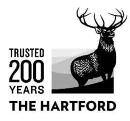






Sm a l l a n d m i d - s i z e d a c c o u n t i n g p r a c t i c e s o f t e n don’t have the manpower or resources to create formalized internship programs to match the stature of those of the Big Four. But smaller firms interested in investing in an intern or two can derive a lot of the same business b e n e f i t s t h a t l a rg e r f i r m s e n j o y, a n d c a n s a t i s f y a n accounting student’s need to learn and experience the professional work environment as well

Accounting practices know how to get to the bottom line If there is no business benefit to hiring, mentoring and paying a student intern, why do it at all?
There are several questions you should answer before you try to recruit an intern In the short term, how will an i n t e r n a f f e c t t h e b i l l a b l e h o u r s o r p r o j e c t s a l r e a d y i n place? In taking the long view, will an intern be considered for full-time employment? Is this a recruiting tool the firm needs?
Once you‘re confident an intern will benefit the firm, the real work begins. “If you are going to have an internship program, you have to commit to planning what the intern’s experience will be, and that might mean making some investments,” says Chris Montague, managing partner of the Chicago office for Plante & Moran, a mid-sized public accounting firm based in Southfield, Mich Plante & Moran’s Chicago office hires four to five interns a year, w h o w o r k d u r i n g e i t h e r t h e s p r i n g s c h o o l s e m e s t e r o r summer break The firm’s smaller office in Elgin, Ill hires two to four more
In April, the United States Department of Labor (DOL) issued Fact Sheet #71: Internship Programs Under the Fair Labor Standards A ct, which clearly defines "trainee status" in the context of qualifying for a compensation exemption The guidelines address concerns over intern exploitation, and state that any for-profit company engaging in an unpaid internship that does not provide mutual value to both intern and employer is likely to be breaking the law Access The Internship Institute’s Compliance A dvisory [InternshipSuccess com] for a summary of the DOL’s guidelines as well as tips and recommendations
At Lauterbach & Amen, a 40-person enterprise, serving the accounting needs of municipalities, Partner Nathan J. Gaskill says the firm, which is based in Warrenville, Ill , w i l l b e u t i l i z i n g f i v e i n t e r n s t h i s summer The firm started an inform a l i n t e r n s h i p p r o g r a m a b o u t seven years ago, but its first attempt was a bit hit or miss at best “The f i r s t y e a r w e h a d a n i n t e r n p r og r a m , i t w a s m o r e o f a p r o b l e m than a help We almost didn’t continue it,” Gaskill explains He says problems arose when there wasn’t enough relevant work to be done,
August 12, 2010 - Chicago, IL
Managing the Intersection of Corporate Governance, Risk Assessment/ Management and Strategic Leadership
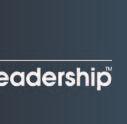
Dan R. Dalton, PhD Founding Director of the Institute for Corporate Governance, Dean Emeritus, and the Harold A. Poling Chair of Strategic Management, Kelley School of Business, Indiana University
September 24, 2010 - Rosemont, IL
Midwest Financial Reporting Symposium
September 29, 2010 - Chicago, IL
International Financial Reporting Standards (IFRS) for Small and MediumSized Entities –1/2 Day Program
Marian Powers, PhD Adjunct Associate Professor, Kellogg School of Management, Northwestern University
October 18, 2010 - Chicago, IL
Developing and Implementing a Balanced Scorecard Framework
Mark Frigo, PhD, CPA, CMA Director, The Center for Strategy, Execution and Valuation, Kellstadt Graduate School of Business, DePaul University
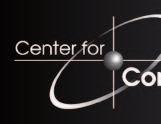
Dedicated to meeting the needs of corporate finance professionals through high-quality executive education, knowledge resources and networking communities
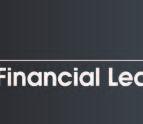
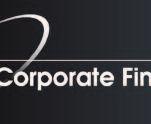

making
Check
October 20, 2010 - Chicago, IL
Technical Workshop: FASB Review for Industry
Fred Christensen
November TBA, 2010 - Chicago, IL
Generations Apart...Yet Only a Cubicle Away
Dennis L. Faurote President, The Faurote Group and Adjunct Professor, Kelley School of Business, Indiana University
December TBA, 2010 - Chicago, IL
Strategic Cost Analysis: Tools for Lowering Your Company’s Costs



John W. Hill, PhD, JD
Arthur M. Weimer Chair in Business, Kelley School of Business, Indiana University
and the lack of a real structure aggravated both interns and staffers.
It was the cyclical nature of the firm’s work (unlike a lot of firms, the summer season is its busiest and that coincides with student summer breaks) that convinced management to try again, this time with a more formalized program in place The key to a successful program, Gaskill comments, is planning.
Sofie Woodburn, human resources manager at the UK-based leadership development consultancy the Centre for High Performance Development, says having structure and purpose is the key to a winning internship program “Planning internships is a time-consuming business. You have to know that the staff can really give interns the opportunity to gain knowledge,” she says
W h a t k i n d o f w o r k w i l l t h e i n t e r n d o ? A t b o t h P l a n t e & M o r a n a n d L a u t e r b a c h & Amen, interns are treated like any new staff a c c o u n t a n t a n d r o t a t e t h r o u g h t h e f i r m s ’ c o r e b u s i n e s s a r e a s M o n t a g u e e x p l a i n s t h a t , “ We t e l l t h e m w e a r e g o i n g t o g i v e t h e m r e a l - l i f e e x p o s u r e t o w h a t p u b l i c accountants do at Plante & Moran,” which, he says, includes stints in areas like audit and tax for clients of different sizes and in different industries.
Firms also have to consider the workload o f s t a f f e r s a l r e a d y i n p l a c e A r e t h e r e e n o u g h p a r t n e r s o r t e a m l e a d e r s o n s t a f f who are willing to be accessible to interns?
Plante & Moran assigns each intern an onstaff “buddy” typically someone who has been with the firm for two to five years and a “team partner” who is higher up in the organization, so that the intern can get exposure at the executive level. At Lauterbach & Amen, which has a flatter organizational structure, interns can expect to take their questions right to one of the firm’s five p a r t n e r s “ O n a d a y - t o - d a y b a s i s w e a r e c o n s t a n t l y r e v i e w i n g t h e w o r k i n t e r n s d o and giving them feedback,” says Gaskill
The key to a mutually beneficial internship is keeping everyone active doing tasks that provide real value to the firm. “Students have
three months where they can have a proper working experience, and while it’s wonderful to have someone to help out with tasks you can’t get to, that’s not where the learning opportunity is,” Woodburn explains, adding that pushing the start key on the photocopier doesn’t qualify as a learning experience for soon-to-be college grads
“The most important thing is to treat them as you would any other valued candidate or e m p l o y e e , o r t h e p r o g r a m w i l l d i e o u t , ” Gaskill adds.
One of the foundations of a successful internship program is communication Montague says his firm conducts a modified performance review with each intern at the midpoint of the internship, with input from human resources, the assigned buddy and the team partner There is also a firm-wide “intern summit” that brings together all current interns to discuss the internship experience At this time, students work on their final presentations to the firm’s partners, during which they relate their experiences
W h i l e c o m m u n i c a t i o n c l a r i t y f r o m t h e firm to the intern is important, it’s the information relayed from the intern to the firm that is most beneficial to the long-term succ e s s o f a n i n t e r n s h i p p r o g r a m M o n t a g u e explains that this feedback helps the firm r e f i n e t h e e x p e r i e n c e f o r f u t u r e i n t e r n s P l a n t e & M o r a n h o l d s r e s e a rc h f o c u s groups during the intern summit, for example, to collect information about what is or isn’t working for the intern class. “We learn what we have done well and what we can do better,” he says.
Some young professionals eager to make a g o o d i m p r e s s i o n o r t o h a v e a j o b o f f e r extended, however, may be reluctant to tell i t l i k e i t i s , Wo o d b u r n p o i n t s o u t , w h i c h means firms need to work a little harder to g e t t h e m o s t u s a b l e i n s i g h t s A h u m a n resources representative or firm employee who doesn’t have supervisory responsibilities may be useful in getting straight to the t r u t h i n t h e s e s i t u a t i o n s . “ S o m e t i m e s y o u really have to take time to get it out of them
A lot of times interns won’t go to their manager and tell them about their experience because they think it may sound like they are complaining,” Woodburn explains
Gaskill has sit-down meetings with each intern at least three times during the internship term and, because of the firm’s size, he’s able to get ongoing input from the interns about their workloads and progress
“It’s most important to start with the planning and then make sure the experience stays on track for the employee and for the person organizing the program,” says Woodburn
As the saying “the proof is in the pudding” i m p l i e s , a n i n t e r n s h i p p r o g r a m ’s s u c c e s s can be measured by the number of interns who go on to become full-time employees With competition for talent running as hot as ever, recruitment by means of internship is a prime reason for having an internship program in the first place
“From our perspective, we certainly value the work interns do while they are here More candidly, it is a recruiting activity more than anything else. It allows us to identify and bring students into the firm to get exposure to us and our firm’s culture, and gives us the opportunity to see them in action,” Montague explains Last year, 95 percent of the offers made by Plante & Moran to interns firm-wide were accepted
G a s k i l l c o n s i d e r s a n i n t e r n s h i p t a n t amount to an extended interview and threemonth jumpstart on training Some interns a r e a s k e d b a c k t o w o r k f o r t h e f i r m t w o summers in a row if they are still in school, and the firm has hired three past interns as f u l l - t i m e s t a f f e r s i n t h e l a s t t w o y e a r s
“From the firm’s perspective, your people are the most important part of your firm. If a client leaves, that’s one client If a staff person leaves, they probably cover 30 clients,” says Gaskill “With the training curve being about two years, finding the right people is the most important thing to us,” and internship programs help to do just that
“They’re still here and eager and chomping at the bit,” he says
“ The most important thing is to treat them as you would any other valued candidate or employee, or the program will die out.”
NEW! Accept more payments, lower processing costs and build your business with a card processing program from Bank of America Merchant Services. Be sure to mention promo code ILCPA01. Phone: Courtney Loacker at 847.615.2870
NEW! 20% off everyday items in-store, online, or through their catalog. Participating members receive free garment pressing and 24 hour tailoring on Jos. A. Bank merchandise purchased, as well as exclusive invitations to attend special events. Phone: 800.285.2265
NEW! $400-$500 discount on our innovative and dynamic four-part review course in online or USB drive format. Roger CPA Review students routinely achieve pass rates of 86%.
Phone: 800.ROG.4CPA
Competitive loan rates and dividends, and access to a diverse line of products and services. Phone: 800.328.1935 Web: www.alliantcreditunion.org/ilcpa
Earn points and get rewards you want, with a no annual fee Platinum Plus MasterCard.
Phone: 866.438.6262 Apply Online: www.bankofamerica.com/creditcards

$300 discount on one full four-part Becker CPA Review course. Phone: 800.868.3900 Web: www.becker.com.

30% member discount on tax and accounting books. Email: http://tax.cchgroup.com/members/icpas (Enter member discount code: Y6202)
Complete administration of 125 Cafeteria Plan. 10% off of enrollment and administrative fees. Phone: 800.422.4661, press 7
Provides effective and ethical solutions for collecting debts and improving cash flow.



Phone: 800.279.3511 Web: www.icmemberbenefits.com

30% discount (up to $420 in savings) on real-time, interactive Online Review Courses or Self-Study Online Review Courses. Discount applicable to multiple or single section purchases. Phone: 800.CPA.2DAY (Use code: ICPASKAP)
Up to 15% off on auto insurance and 10% on home insurance. Call today for your no-obligation rate quote! Be sure to mention group #3408.
Phone: 800.835.0894
Special group discounts on life, disability, major medical and liability plans. Phone: 800.323.2106 (liability) or 800.842.ICPA (medical & life plans)
Discounts on products and services. Phone: 800.325.7000
Offering more than 65,000 products at competitive prices.
Phone: Wanda Brooks at 708.969.5355 | Email: wbrooks@warehousedirect.com
Dark economic clouds have forced companies across all industries to look for ways to cut operating costs and boost profits Accounting firms are no exception, with many looking to their investments in human capital for help in the quest to “stay in the black.”
Some companies are finding the answer in flexible work arrangements, whether job-sharing (two employees work part-time to cover one full-time position), flex-time (employees choose their workday start and end times), telecommuting (employees work from a remote location), compressed work weeks (employees work 40 hours in fewer than the traditional five days) or all of the above Truthfully, companies that “flex” do more than keep their workers happy when salary increases and bonuses are scarce

“Right now it’s difficult for firms to reward with higher compensation, so helping workers achieve work-life balance through more flexible arrangements can be a great alternative,” says Janet Flewelling, director of human resources operations for personnel management services firm Administaff
In its recent Workplace Flexibility 2010 study, the G e o rg e t o w n U n i v e r s i t y L a w C e n t e r f o u n d t h a t n e a r l y 8 0 p e rc e n t o f w o r k e r s w o u l d l i k e t o h a v e m o r e f l e x i b l e o p t i o n s , a n d t h o s e s a m e w o r k e r s would use those options if there were no negative consequences at work The group also found that the percentage of the workforce that uses a flexible s c h e d u l e i n c r e a s e d d r a m a t i c a l l y f r o m 1 9 8 5 ( 1 2 4 percent) to 1997 (27 6 percent), and has since leveled off Within the private sector, the highest rates o f f l e x - t i m e a r e f o u n d a m o n g t h o s e w o r k i n g i n financial activities (37.7 percent), followed by the b u s i n e s s s e r v i c e s ( 3 7 . 6 p e rc e n t ) a n d i n f o r m a t i o n (34 9 percent) industries
Best Buy is one of the most visible examples of flexibility done right. For years the electronics retailer has offered its corporate office employees the opportunity to set the start and finish time of their workdays (within parameters established by the corporation) The return on investment has been significant, with Best Buy reporting a 35-percent increase in employee productivity as a result of this initiative
Best Buy isn’t alone in its mission to use flexibility to boost its bottom line The Alliance f o r Wo r k - L i f e P r o g r e s s ( AW L P ) s a y s t h a t c o m p a n i e s s u p p o r t i n g f l e x i b l e w o r k a r r a n g ements experience a 3 5 percent higher market value than companies that use more traditional scheduling.
What’s more, says the AWLP, Hewlett Packard’s compressed work week meant a 200percent increase in the number of transactions conducted on a daily basis and a 50-perc e n t r e d u c t i o n i n o v e r t i m e . A n d U P S ’ f l e x i b l e w o r k s c h e d u l e s h e l p e d t h e f i r m r e d u c e employee turnover by 44 percent
These aren’t the only benefits of a flexible work arrangement In the case of telecommuting, for example, employers can reduce the amount of floor space required for offices. “This
translates into fewer desks and office equipment, along with a smaller budget for utilities such as heating and cooling,” says Flewelling And in the case of job sharing, employers can reduce their headcounts without any interruption to productivity and service “And don’t forget that companies save on the cost of benefits when using two part-time employees, rather than one full-time employee,” she adds.
What’s more, by allowing employees to start work at 6 a m and l e a v e a s l a t e a s 9 p m , a c o m p a n y ’s o p e r a t i o n a l h o u r s a r e expanded by up to eight hours a day, with no additional manpower In essence, they’re gaining hours of coverage
Kathy Downey, managing partner in Plante & Moran’s Northwest Chicago office, says her firm has been reaping the benefits of f l e x i b l e w o r k a r r a n g e m e n t s f o r y e a r s “ We s e e o u r s t a f f a s t h e lifeblood of our firm’s future, and we consider work-life balance critical to their happiness and ability to do good work,” she says

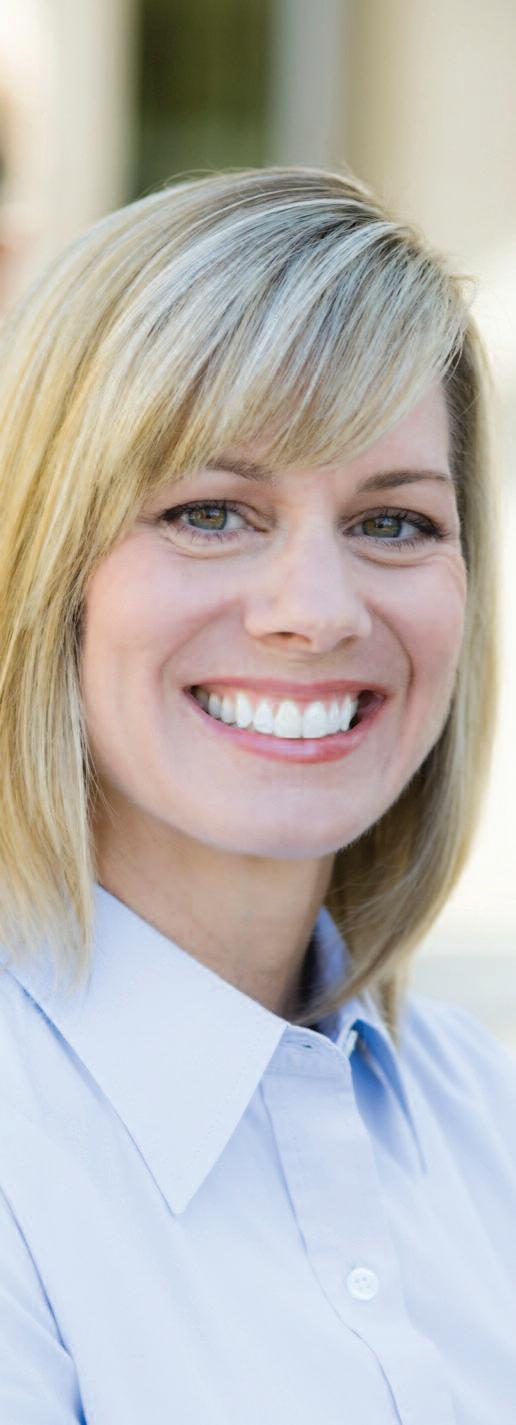
Downey explains that although the financial ROI is difficult to pinpoint, lower employee turnover obviously means significant savings “Turnover costs for a CPA firm are very high, based on the number of hours and amount of energy invested in developing accountants,” she says. “You can’t just ‘plug’ someone into a spot left behind by a seasoned employee ”
But you can go the extra mile to ensure that your veteran worke r s d o n ’t l e a v e i n t h e f i r s t p l a c e . “ F l e x i b l e w o r k a r r a n g e m e n t s allow accounting firms to keep their best people,” says Downey “That’s the business case ”
When developing a flexible work policy, Flewelling recommends that you consider the company’s onsite personnel needs first The firm that needs employees physically on site at all times, for examp l e , s h o u l d s t e e r c l e a r o f a r r a n g e m e n t s t h a t l e a v e t h e m s h o r t staffed (such as telecommuting) Job-sharing or compressed workweeks might be a better choice.

O n t h e o t h e r h a n d , s a y s F l e w e l l i n g , f i r m s t h a t e x p e r i e n c e reduced business flow after tax season might consider a virtual or telecommuting arrangement for non-core workers. “Throw out the regular 9 to 5 schedule,” she says, “and pay them for results, rather than by the hour ”
Setting up and administering flexible work arrangements can be challenging for accounting firms that are used to a more traditional schedule. “You can’t just assume that Sally is going to be here because everyone else has clocked in,” says Downey “If Joe is going to be on a different schedule next week, those around him must be notified and his responsibilities have to be covered when he’s not here Otherwise, things can unravel pretty quickly ”
F l e w e l l i n g s a y s c o m p a n i e s t h a t a r e n e w t o n o n t r a d i t i o n a l arrangements should plan carefully and understand that an adjustment period may be involved Workers who aren’t onsite on a daily basis, for example, have to keep in constant contact with the home office, while those who are sharing jobs have to efficiently exchange work updates
Also consider how managers will measure performance, particularly for those workers who aren’t sitting in the office with a trad i t i o n a l 4 0 - h o u r- a - w e e k s c h e d u l e “ C l e a r l y o u t l i n e w h a t ’s e x p e c t e d o f e v e r y o n e , a n d a d j u s t y o u r e v a l u a t i o n p e r i o d s t o accommodate the new work structure,” Flewelling advises “As work-life balance becomes even more important, these arrangem e n t s w i l l b e a g r e a t w a y t o a c c o m m o d a t e e m p l o y e e s ’ n e e d s while also benefiting employers ”

As the role of the chief financial executive evolves and expands, we explore three developing areas that weigh on today’s finance leader.
 By Carolyn Tang
By Carolyn Tang
o
i n t h e
m o re a c t i v e ,
Less than a generation ago, company finances were tracked using p a p e r l e d g e r s a n d c a l c u l a t o r s To d a y, i n f o r m a t i o n t e c h n o l o g y comprises a significant chunk of overall spending, which means CFOs have had to get their knowledge bases up to speed quickly M a rc L i n d e n , C F O o f I n t a c c t , a n a w a r d - w i n n i n g p r o v i d e r o f financial management and accounting applications, says it’s more important than ever for a CFO to be involved in IT investment decisions in order to maintain company competitiveness and to ensure financial decisions are held to the same standards as any other investment “IT investments should be made to meet specific business objectives; for example, to increase revenue, improve efficiency or meet regulatory requirements,” he explains
When it comes to enterprise software, says Linden, the CFO is often the purchasing program’s executive sponsor, largely because the software is used for financial management and insight into revenue and cost. In other words, it is a mission critical tool for the finance function.
“CFOs steer the selection process, marshal internal resources, and are often in charge of overseeing implementation of the software,” explains Charles Rathmann, a marketing analyst with IFS North America “Enterprise resource planning (ERP) has a real impact (beyond) the operation of the finance function of a company by tying various departmental functions into the general ledger ”
Michael Bechara is the managing director of Granite Consulting
consultancy. In his experience, the typical CFO has influence over how much money is spent, but not as much influence over what the money is spent on
“In many ways, IT is still a ‘black box,’ as technology remains mysterious and intimidating for many,” he explains “The challenge is that IT professionals are very tech savvy, but are not particularly focused on return on investment The CFO needs to delve into the IT area to a greater degree in order to understand exactly what benefits are received from the investments made ”
Linden sees benchmarking IT spending against other possible investments as essential in ensuring the highest possible returns He says the CFO is uniquely positioned to make these decisions because he/she has the training and experience necessary to maximize the outcome of any financial trade-offs Additionally, the CFO is one of the few executives in a firm that has insight into all aspects of the business
“While it isn’t practical or appropriate for a CFO to be involved i n e v e r y I T s p e n d i n g d e c i s i o n , t h e C F O s h o u l d b e i n v o l v e d i n d e v e l o p i n g t h e c o m p a n y ’s o v e r a l l I T s t r a t e g y a n d o b j e c t i v e s , ensuring proper investment justifications are made, setting and ma n a g i n g a n o v e ra l l I T a n d c a p i t a l b u d g e t , s e t t i n g a p p ro p ri a t e approval levels, and ensuring reporting of actual versus plan information for key IT measures,” he says
W h i l e s o m e C F O s h a v e t e c h n o l o g y b a c k g r o u n d s , o t h e r s a r e slow to get up to IT speed. In fact, in a Deloitte survey of CFO headhunters, it was revealed that many CFOs aren’t keeping pace with the business marketplace, and subsequently are setting the wrong priorities.
“ A l o t o f C F O s a r e j u s t t o o ‘ G A A P - c e n t r i c ’ t h e s e d a y s , ” answered one respondent. “They’re focused on operations and, as a result, they’re too cautious. This is a real challenge in organizations where the CFO should be participating in the strategic development of the company.”
Overall, however, Lawrena Colombo, a partner at PricewaterhouseCoopers, LLP, believes the impact of this rapid evolution has been positive “Individuals with high professional and personal standards have been stepping up to CFO roles or have been acting with great integrity in this challenging environment, and have been bringing credibility to their companies In turn, the investor community has been clearly differentiating well-run, transparent companies in these recessionary times, and the share prices have reflected this The reward for the risk of being a CFO remains positive, as long as accountability and performance remain high,” she says
Of course, this “evolutionary phenomenon” is not limited to the IT function These days, the CFO is taking an increasingly active role in large-scale company decision-making, and is more likely to partner with, rather than merely serve, the all-knowing, all-powerful CEO
o
t a n t b u s i n e s s partner for the CEO, and should be involved in every key decision that adds or subtracts substantially from the value of the organization,” says Colombo
Bill Graf, a partner with Deloitte & Touche LLP, agrees that CFOs h a v e u n i q u e l e a d e r s h i p a n d o rg a n i z a t i o n a l s k i l l s t h a t p o s i t i o n them well to be trusted advisors to the CEO Not only does the CFO have a bird’s eye view of organizational needs from both a financial and a strategic vantage point, but in the case of public companies, CFOs also tend to have a feel for shareholder and market expectations
Graf identifies four key roles that fall under the CFO function:
“Public scrutiny of the executive finance function has intensified of late, driven by hesitant ripples and unexpected fluctuat i
n s
e co n o m i c l a n d s c a p e . Th e spotlight is specifically focused on the C FO , s i n ce i n v e s t o r s , e m p l o y e e s a n d even government branches are looking t o co m p a n i e s t o p l ay a
vocal par t in financial accountabilit y ”
n Operator: CFOs have to operate an efficient and effective f
financial planning, financial analysis, treasury, tax, and more
n Steward: As the steward of corporate value, CFOs work to protect the vital assets of the company, ensure compliance with financial regulations, close the books correctly and communicate value and risk issues to stakeholders.
n Catalyst: CFOs stimulate and drive the timely execution of change in the finance function or enterprise Using the power of the purse, they can selectively drive business improvement initiatives, such as enhanced enterprise cost reduction and pricing execution all of which will add value to the company
n Strategist: CFOs take an important seat at the strategic planning table, and influence the future direction of the company. They are vital in providing financial leadership, and aligning business and finance strategy to grow the business
With each of these responsibilities, the CFO role is inextricably intertwined with that of the CEO, and as such, significantly more visible than it once was This increased exposure adds another dimension to the CFO’s responsibilities
Faizal Chaudhury manages the internal audit department at Stepan Company, a global chemicals manufacturer located just north of Chicago He believes that increased scrutiny and accountability in t
increase in the CFO’s oversight and visibility.
“The Sarbanes-Oxley Act of 2002 fundamentally changed the finance landscape, putting accountability front and center But I think this trend of partnering instead of serving is also based on a realization that objective financial advice is critical to success, and the way to achieve this is by making the finance function a value-added partner as opposed to thinking of it as a cost center,” he explains.
The CFO is also the point person when it comes to the investor community “As the financial crisis has dragged on, investment analysts are asking evermore penetrating questions about the comp a n y ’s f i n a n c e s , ” s a y s B e c h a r a . “ I n a n e n v i r o n m e n t o f s h i f t i n g accounting rules and transactions of increasing complexity, having a CFO who clearly explains to investors the company’s strategy is priceless.”
But with this increase in responsibility comes an increase in personal risk; the greater a CFO’s public visibility, the greater his or her assumption of blame when expectations are not met. What’s more, the CFO may be expected to take the heat and direct public attention away from the CEO office in an effort to protect the company as a whole
“As a senior executive of the organization, CFOs position themselves to be in the public domain, delivering company information, including historical results, outlook for the future and company strategy,” Graf explains. “Those that deliver a message tend to be held fully or partially accountable when expectations are not reached or desired results are not achieved ”
Which is not to say that the CEO should try to protect or shelter the CFO “The savvy CEO knows how valuable a CFO can be as a representative of the management strength of the company, and will give them room to establish relationships with the investor
community, the board of directors, and other external and internal constituents,” says Colombo.
A symbiotic relationship often exists between the CEO and the CFO For instance when the CEO leaves, the CFO may well go
Pharmaceuticals CEO John Stocker and CFO Elmo de Alwis in April of this year; and former Porsche CEO Wendelin Wiedeking and his CFO, Holge Härter, in 2009
The fact that the CFO often takes over the executive seat when a CEO leaves is another illustration of just how much of a company’s brain trust resides in both roles This happened earlier this year when AIG CFO Alan Lund assumed the reins when acting chief executive Jon Plueger resigned less than two months after taking over
Whether CFO or interim CEO, the weight of responsibility is a heavy one. Both internal and external stakeholders hold the CFO responsible for establishing a culture of accurate reporting, fair dealing and consistent, visible performance “Accountability for CFOs is much more personal than in the past. Senior executives across organizations are under great scrutiny concerning their personal behavior and their judgment in both private and public settings,” Colombo explains
Because of this, CFOs are being very particular about the people to whom they give their allegiance. “Increasingly, qualified CFO candidates are being very choosy in terms of accepting CFO p o
Chaudhury. “Given that there are financial and criminal penalties i n v o l v e d w i t h S a r b a n e s - O x l e y, p o t e n t i a l C F O s a r e n o w f a c i n g more than just the loss of reputation if things don’t work out quite as planned.”



The mar kets are in f lux. The accounting r ules and federal regulations are still under constr uction. U niver sities don’ t provide it as a st andard area of focus. And yet, the age of green accounting is dawning. By
 Kristine Blenkhorn Rodriguez
Kristine Blenkhorn Rodriguez
Before you shrug off green accounting as just a fad, consider the fact that various accounting organizations, including the Financial Accounting Standards
changing federal and global environmental regulations Although still a work in progress, when regulations ultimately converge with accounting, there’ll be a mighty sea change one that offers CPAs yet another career option

Green accounting is far more than tracking carbon emissions using nifty softw

accounting and sustainability accounting, it blends the financial, operations and sustainability functions of enterprises within all industries.
“A significant number of companies even publish separate reports alongside their annual reports to expand on their so-called corporate social responsibility efforts, many following the guidelines of the Global Reporting Initiative,” says Julie Lockhart at Accounting for a Sustainable Future

“I do believe CPAs will be doing a good portion of the future accounting in this area,” says Jeffrey Frost, director of environmental accounting firm AgRefresh. “Large firms will send their junior partners to be trained at greenhouse gas institutes and the like But right now the rules both traditional accounting and governmental are in flux. Many are still being created. There’s a market but also much uncertainty as to how it will play out ”
For progressive companies with a mission and/or charter that spells out corporate sustainability as a key component, global warming in and of itself might be enough to spur green accounting practices. For those at the other end of the spectrum and all points in between, however, a more compelling financial case has to be made
Cue The Energy Efficiency Imperative: Why CFOs Need a Financial Strategy for Energy and Carbon, a December 2009 report published by independent research firm Verdantix. The report cites increasing oil and electricity prices, the hidden cost of carbon, growing risks from energy supply disruption and board-level climate change compliance issues as strong reasons for a CFO to make energy efficiency a new imperative The report urges CFOs to create a multi-year energy efficiency plan to maximize cost savings, help the CEO meet carbon reduction goals and make financial decisions based on the total cost of ownership
Fiscal sense alone is not driving CFOs to focus on this area, however US Representative Henry Waxman introduced The American Clean Energy and Security Act last year The bill calls for a nearly 20-percent reduction of carbon emissions by 2020 by cutting methane, carbon dioxide and other greenhouse gasses It also calls for a cap-and-trade system for carbon emissions
The Act has passed the House, and similar legislation is under development in the Senate In the meantime, the Environmental Protection Agency (EPA) is requiring new carbon emissions disclosures for 2010 to be reported in 2011. All in all, there’s good cause for CFOs to take an interest in environmental accounting
Boards of directors are also increasing their focus on environmental matters, as investors demand greater transparency concerning a company’s exposure to carbon costs Savvy finance executives see the writing on the wall and are asking their teams to include the cost of carbon in their financial forecasts All indications are that a “carbon-constrained” economy is on its way, and emitters of all sizes are gearing up for the imposition of limits and the requisite reporting that accompanies them
Last year, Australian analyst firm S2 Intelligence projected that US companies would spend $91 billion on green accounting technology in the next six years They estimated worldwide spending for the same to be $595 billion through 2015.
According to the 2009 Greenhouse Gas & Climate Change Workforce Needs Assessment Survey Report (Greenhouse Gas Management Institute & Sequence
Staffing), many industry experts believe that carbon-trading volumes will rival those of other major commodities such as steel or coal The same study estimates that if the United States entered the carbon-trading market today and encouraged other countries to follow suit, the global carbon market would swell to anywhere from $1 to $2 trillion within the decade In fact, it would become one of the most significant international commodity markets
High emitters, such as energy-reliant manufacturers and powerg e n e r a t i n g u t i l i t i e s , a r e o b v i o u s l y f i r s t e n t r a n t s i n t o t h e g r e e n accounting foray, simply because they need to be the stakes are highest in these industries However, companies in a variety of sectors are already embracing green accounting (large retailers such as Walmart are asking suppliers to account for their carbon footprints, for example) Scrutiny of carbon footprints is likely to turn into a customized scorecard for each supplier that deals with a m e g a - b u s i n e s s A n d , i n f a c t , i t ’s h i g h l y l i k e l y t h a t c o n s u m e r products will begin to display labels identifying their carbon footprints to help to guide consumers in buying the greenest products
Given the household names that are now tracking their carbon footprints and issuing sustainability reports, green accounting skills are poised to be in extremely high demand. More than 83 percent of the 2009 Greenhouse Gas Management Institute study respondents believe there is either a moderate or high risk that carbon markets will suffer from problems similar to those symbolized by the Enron, WorldCom and Tyco accounting scandals of the past. However, if seasoned CPAs are brought in to help regulate reporting, that risk should decrease.
And yet, it seems that current accounting undergraduates will not graduate with the requisite green accounting training necessary, simply because universities are not providing courses that cover this discipline. In fact, almost 82 percent of respondents to the Greenhouse Gas Management Institute study believe that universities are not currently providing the necessary skills for new graduates to work within this emerging industry.
Harvard University is making moves in the right direction, having worked with the Greenhouse Gas Management Institute to provide a course on climate change within its Extension School Program. “Investing in a Sustainable Future” is offered as part of its S u s t a i n a b i l i t y a n d E n v i r o n m e n t a l M a n a g e m e n t P r o g r a m s . B u t again, there is no true finance/accounting angle.
Illinois schools seem to be no exception. Dr. Elizabeth Murphy, a s s o c i a t e p r o f e s s o r i n t h e S c h o o l o f A c c o u n t a n c y a n d M I S a t DePaul University, Chicago, says the issue is touched on margina l l y i n s o m e t r a d i t i o n a l a c c o u n t i n g c l a s s e s , b u t t h a t n o f o r m a l green accounting courses are on the horizon.
“Some accounting pronouncements in financial reporting deal with this issue asset retirement, for instance. But, we have no courses in environmental accounting. There aren’t enough rules around it yet,” she explains.
Dr. Murphy also mentioned that DePaul University President Reverend Dennis H. Holtschneider, C.M., recently sent faculty a memo announcing the establishment of an internal Sustainability Initiatives Task Force, which will focus on sustainability initiatives in a variety of areas, including curricula
It’s difficult, however, to create a syllabus when there’s no clear direction on what should be covered, says Dr L Murphy Smith, a l e a d i n g s c h o l a r o n e n v i r o n m e n t a l a c c o u n t i n g a n d p r o f e s s o r o f a
responsibility of a corporation regarding environment remediation liabilities But there’s very little out there to address companies
a t i n g a c c o u n t i n g f o r s u s t a i n a b i l i t y a n d e n v i r o n m e n t a l practices that are proactive ”
As a former professor of accounting at Western Washington University, Lockhart created and taught a popular environmental accounting elective course for 12 years. “If we are forward-thinking,” she explains, “we will realize that environmental accounting affects all of the sub-areas of accounting Management accountants need to understand how to trace environmental costs, create metrics to track performance and estimate risks of noncompliance with environmental regulations; systems specialists need to design tracking into the information systems; and auditors have an opportunity to jump into the emerging need for attestation of sustainability reports. Plus, getting students to think about the implications of environmental accounting is a great way to develop critical thinking skills.”
“Companies will be much more focused on this area, as reporting requirement such as the EPA’s mandatory greenhouse gas rules c o m e i n t o f o rc e , b r i n g i n g c o m p l i a n c e c o n c e r n s i n t o s h a r p e r focus,” says Brian Murrell, a partner in Deloitte’s Accounting, Valuation & Analytics practice.
“Companies will leverage internal resources, such as internal audit, to the extent they can to validate disclosure data, but many will also look for third-party help as well,” Steve Engler, director of Carbon Management Services for Deloitte, adds “This is not an area they will take lightly. The SEC offered interpretive guidance on disclosure requirements, indicating enterprises must include a thorough discussion in company disclosures on risk regarding climate change That discussion and the disclosures will need to reconcile completely with reporting, CEO comments and the like It’s not dissimilar to financial reporting and verification ”
The resulting niche could benefit CPAs who have been building their skills arsenal in the environmental area. “We’ve already got d e r i v a t i v e a c c o u n t i n g , p e n s i o n a c c o u n t i n g , l e a s e a c c o u n t i n g , ” says Murrell. “In a larger CPA firm, it’s not unreasonable to think you’ll have carbon and renewal accounting ”
F u t u r e C PA s n e e d t o h a v e b o t h f i n a n c i a l a n d e n v i r o n m e n t a l accounting expertise if they hope to specialize in this emerging area, says Pankaj Bhatia, director of the World Resources Institute’s Greenhouse Gas Protocol Initiative. “The skill set is very similar, actually The way a company consolidates its financial accounts is the same method you should use for greenhouse gas accounting. Yo
assets you’re writing off.”
I t ’s j u s t c o m m o n s e n s e , s a y s E n g l e r “ R e p o r t i n g e m i s s i o n s involves numbers Where numbers are involved, accountants are not too far behind ”



Filling the pipeline with talented young accounting professionals is the problem; boosting minority representation could be the solution.
By Jacqueline BabbHomeowners know the story with pipes There’s always a beginning. There’s always an end. There’s usually a leak somewhere in the middle And so it goes with the pipeline of diverse students who become CPAs
Specifically, the pipeline begins with the CPA Exam and ends with partner or senior executive status But statistics show that, w h e n i t c o m e s t o A f r i c a n - A m e r i c a n a n d Latino professionals, making it all the way from beginning to end is far from certain.
While the American Institute of Certified P u b l i c A c c o u n t a n t s ( A I C PA ) r e p o r t s t h a t 11 5 p e rc e n t o f a c c o u n t i n g u n d e rg r a d uates are African-American and 6 percent a r e H i s p a n i c / L a t i n o , t h e a c t u a l d e m og r a p h i c s w i t h i n a c c o u n t i n g f i r m s a r e closer to 4 percent at the junior level, and they decline from there The percentage of minority CPA partners within accounting firms hovers around 1 percent These numbers have remained unchanged over the past several years
At the other end of the spectrum lies the Asian and Pacific Islander demographic. Ascend, a Pan Asian organization dedicated to enhancing the voice of Pan Asian and Pacific Islander businesspeople, reports that their stakeholders make up 28 percent of the business school population, and that the percentage of Asians and Pacific Islanders to hold a business degree is 85 percent higher than that of the average in the United States.
S o w h y t h e l o w n u m b e r s f o r s o m e groups more than others? Money is one of t h e b i g g e s t b a r r i e r s U n i v e r s i t y a n d c o ll e g e t u i t i o n i s s i m p l y t o o h i g h , w h i c h o f t e n m a k e s c o m m u n i t y c o l l e g e s m o r e attractive to minority students In fact, the American Association of Community Colleges reports that African-Americans and Latinos represent 13 percent and 16 percent, respectively, of all community college students
C o m m u n i t y c o l l e g e s , h o w e v e r, m a y lack the name recognition employers trad i t i o n a l l y l o o k f o r w h e n s c o u r i n g f o r s o o n - t o - b e - g r a d s t o r e c r u i t i n t o t h e i r ranks, and campus recruiting efforts may not extend as far as local community colleges even though they may well be the most logical choice
W h a t ’s m o r e , a s u r v e y c o n d u c t e d f o r
The CPA Journal noted that minority students perceive more hurdles to becoming a C PA t h a n d o t h e i r C a u c a s i a n c o u n t e rparts, most notably due to a lack of minor-
ity role models and mentors in senior ranks of the accounting profession
In the face of these challenges, expanding opportunities for minority students to enter the profession is imperative
R i c k C e r d a , C PA , s e n i o r m a n a g e r o f
C r o w e H o r w a t h a n d p r e s i d e n t o f t h e
C h i c a g o C h a p t e r o f t h e A s s o c i a t i o n o f
L a t i n o P r o f e s s i o n a l s i n F i n a n c e a n d Accounting (ALPFA), explains that, “Based on my experience, a significant amount of the young minority professionals currently e n t e r i n g a c c o u n t i n g a r e f i r s t - g e n e r a t i o n c o l l e g e g r a d u a t e s w h o h a v e w o r k e d e x t r e m e l y h a r d t o l i f t t h e m s e l v e s o u t o f challenging environments. Firms that can g i v e t h e s e y o u n g , t a l e n t e d p r o f e s s i o n a l s the opportunity to excel will be rewarded with a high level of engagement and loyalty In a profession that often finds itself losing talent after a few years, the value of e n g a g i n g p r o f e s s i o n a l s w h o l o v e w h a t they're doing and are loyal to the firm they work for results in tremendous returns for the firm, its clients and the individual.”
What’s more, a talented multi-cultural t e a m i s a s i g n i f i c a n t b u s i n e s s a s s e t i n t o d a y ’s g l o b a l e c o n o m y S o m e o f t h e savviest organizations in the world, in fact, r e c o g n i z e t h a t a n i n c r e a s i n g l y g l o b a l economy demands diversity of experience and an unwavering commitment to innovation Clients today want service teams that reflect the same level of diversity that e x i s t s w i t h i n t h e i r o w n o rg a n i z a t i o n s “Accounting firms are getting the message t h a t f u t u r e b u y i n g d e c i s i o n s m a y b e i m p a c t e d b y t h e a b i l i t y t o f i e l d a m o r e diverse team,” notes Scott Steffens, CPA, a partner at Grant Thornton
K e y t o e n c o u r a g i n g minorities to enter the profession is understanding their cultural context. Studies show that minorities are often first-generation college students living in urban areas They tend to come from tight-knit communities in which it is customary to choose one of a handful of “acceptable” professions. Making a choice of major outside of the social norm is difficult Also, looking to white-collar profess i o n s , s u c h a s a c c o u n t i n g a n d f i n a n c e , medicine and law, may well be perceived as simply unattainable
And yet, the Diversity Pipeline Alliance’s research confirms that younger students of color are motivated and ambitious, and that they value stability and challenge in a supportive work environment. Furthermore,
they perceive careers in business as aligned with their priorities In other words, they are a perfect fit for the accounting profession
Accounting, however, isn’t alone in its struggle to attract top diverse talent Leaders in professions as far-ranging as medic i n e a n d e n g i n e e r i n g a l s o a r e t a k i n g a fresh look at inclusion strategies
T h e A s s o c i a t i o n o f A m e r i c a n M e d i c a l Colleges (AAMC), for example, launched a marketing campaign in 2006 to encourage minority students to choose medicine. The c a m p a i g n i n c l u d e s a w e b s i t e [ a s p i r i n gdocs.com], advertisements for the website and pilot outreach initiatives on four college campuses. According to the AAMC, the website received more than 100,000 hits within its first year, and of those registering for the site, 55 percent were students from minority backgrounds.
T h e N a t i o n a l A c a d e m y o f E n g i n e e r s (NAE) reached far back in its pipeline to attract and prepare talent Its challenge is that minority students may have an intere s t i n e n g i n e e r i n g , b u t d o n ’t n e c e s s a r i l y have access to advanced math and science courses in high school The NAE has theref o r e i n v e s t e d i n K - 1 2 e d u c a t i o n , h i g h e r e d u c a t i o n a n d g o v e r n m e n t i n i t i a t i v e s t o remove systematic barriers to degree completion As of August 2008, the NAE had l e v e r a g e d r e l a t i o n s h i p s w i t h 5 0 p a r t n e r institutions to establish mentorship-based academies with after-school programs in urban areas
A c c o u n t i n g f i r m s h a v e b e e n a m o n g s t the most proactive of employers in terms of inclusion efforts Many firms have established internal resource groups to serve the needs of its minority professionals These c o m m u n i t i e s h o s t p r o f e s s i o n a l d e v e l o pment programs and roundtables, and fost e r m u c h - n e e d e d a n d m u c h s o u g h t - a f t e r mentoring relationships Accounting firms also have been diligent in partnering with organizations that represent groups influencing and impacting the talent pipeline, including Ascend [ascendleadership.org], ALPFA [alpfa.org] and the National Association of Black Accountants, Inc. (NABA) [nabainc.org].
To a certain extent, though, every CPA is part of the solution. No matter your role within an organization, you can help to fix the leak in the talent pipeline. It begins with an understanding of cultural competence and an appreciation of the talent that sur-
rounds you Incremental efforts in this regard yield large returns.
Young minority professionals already w i t h i n y o u r r a n k s c a n i m p a c t t h e pipeline by reaching back to students at their alma maters to share their insights and t h e i r e x p e r i e n c e s o f t h e p r o f e s s i o n A t same time, they can reach up to professionals in senior ranks to share their experiences of working within multi-cultural teams.
A l s o , s a y s S a m m y D e l g a d o , a C PA w i t h A b b o t t , “ G e t t i n g p a r e n t s i n v o l v e d c a n b e a great way to increase family support In my e x p e r i e n c e , I h a v e s e e n s o m e g r e a t e v e n t s h o s t e d b y a c c o u n t i n g f i r m s a n d D e P a u l ' s M A H A o r g a n i z a t i o n w h e r e p a r e n t s a r e invited to have a dinner, listen to their children’s success stories and interact with other f a m i l i e s w h o h a v e s i m i l a r s t r u g g l e s t h a t threaten prioritization of education and work e x p e r i e n c e H a v i n g s o m e o n e e l s e t h e y c a n r e l a t e w i t h p r o v i d e e x a m p l e s o f t h e i r o w n career paths can increase family buy-in and promote further encouragement.”
Seasoned professionals can affect change by influencing infrastructure enhancements and taking the time to learn about diverse professionals within their organizations their heritage and culture, and the barriers they may have overcome to become CPAs The strongest statement about diversity should come from the top. Empower employees to create inclusionoriented initiatives, and to establish minorityspecific mentoring programs and workplace communities Set a roadmap with clear goals and key success measures, unequivocally communicating the fact that you are committed to a diverse workforce, and all the benefits that come with it Word of mouth is a powerful tool make your commitment known to a wider audience, therefore boosting your attractiveness to successive generations of talented minority grads
O p p o r t u n i t i e s a l s o e x i s t o u t s i d e o f t h e w o r k p l a c e . S u p p o r t p r o g r a m s t h a t c r e a t e opportunities for diverse students Organizations, such as NABA, ALPFA and Ascend, for e x a m p l e , o f f e r m e n t o r s h i p a n d v o l u n t e e r opportunities. What’s more, the Illinois CPA Society is launching its Mary T. Washington Wylie Scholars and Fellows Program, with the g o a l o f i n c r e a s i n g t h e n u m b e r o f A f r i c a nAmerican and other underrepresented minorities in the accounting profession.
The opportunities to motivate a generation of ethnically diverse accounting professionals are at your fingertips You simply have to look for them and act.
generation of African-American CPAs who could not find work due to the racial discrimination prevalent in 1950s America In the basement of her Southside Chicago home, Mrs Washington mentored some of today ’ s most notable accounting leaders, and created the firm now known as Washington, Pittman & McKeever
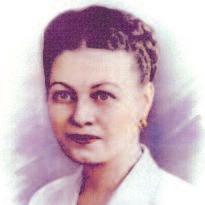
In 2006, Lester McKeever, managing principal of the firm, established the Mary T Washington Wylie Opportunity Fund, with the goal of raising $1 million to support a new scholarship program In this, Mrs Washington’s “interest in young people and her interest in effectuating young people, par-
says McKeever
To date, nearly $500,000 has been committed, including gifts from Washington, Pittman and McKeever; Ernst & Young; Deloitte; Grant Thornton; Crowe Horwath; and Fred Ford/Draper and Kramer Thanks to this support, the Mary T Washington Wylie Scholars and Fellows program launched in April, with a call for young professionals to serve as Fellows, the cornerstones of a triad of mentors that also includes a senior professional and a Ph.D. The Fellows not only mentor students, but also engage in leadership activities to build their repertoire of skills. This collaborative effort between the Illinois CPA Society and the CPA Endowment Fund of Illinois will strive to bring mentorship to the next generation of African-Americans and other underrepresented minorities in the accounting profession Students from Harold Washington College in Chicago will serve as the pilot group of Mary T Washington Wylie Scholars Fellows will lead them through a series of professional development workshops, and Ph D s in accounting will coach them on their four-year college applications Upon transferring t o a f o u r- y ear c o l l ege o r u n i v er s i t y, S c h o l ar s w i l l r ec ei v e n o n t r adi t i o n al financial assistance in the form of textbooks, summer school, laptops and other items not covered by financial aid packages They ’ll also have an opportunity to intern with an accounting firm or corporation during their fourth year, and will become eligible for a complimentary CPA Exam review course upon graduation Up to 10 Scholars will be chosen annually, for a total of 40 in the program when it reaches full capacity in 2014 The triad of mentors will remain a constant presence throughout the program to support student Scholars.
org
WeareKUTCHINS,ROBBINS &DIAMOND,LTD.,agrowing SchaumburgIllinoisfullservice CPAfirm.Comemeetwithusto hearfirst-handabouthowweare
Different, Newand Attractive–our DNA .
Different Handsonresponsibility/Consistent firmgrowth/No“killerhours”
New Entrepreneurialspirit/ Highlycomputerized/internetbased software (state-of-the-artequipment) / Charitableinvolvementatbothfirm andindividuallevels
A ttractive Friendlyworkenvironmentwithgood workspace/Fullystockedkitchen yeararound/Greatbenefitsand compensationpackage
Wehaveopeningsinouraudit andtaxdepartmentsforthe rightprofessionalswithtwo ormoreyearsofexperience.
Contact: AlKutchins,CPA
847-240-1040x135 akutchins@krdcpas.com
ILLINOIS PRACTICES FOR SALE: Downtown Chicago practice gross over $200K; Grayslake CPA Practice gross $491K; Rochelle CPA Practice gross $106K; Peoria Area Tax & Accounting Practice gross $137K; Springfield Area CPA Practice gross $135K For details, call 1-800-3970249 or visit us at www accountingpracticesales com to inquire about available opportunities and register for free email updates
THINKING OF SELLING YOUR PRACTICE? Accounting Practice
Sales is the leading marketer of accounting and tax practices in North America We have a large pool of buyers, both individuals and firms, looking for practices now We also have the experience to help you find the right fit for your firm, negotiate the best price and terms and get the deal done To learn about our risk-free and confidential services, call Trent Holmes with The Holmes Group at 1-800-397-0249 or email trent@accountingpracticesales.com
By: Crandall & Brackett, Ltd.
(630) 653 7922
email: robert@crandall-brackett.com
Web: www crandall-brackett com
Our only service is performed on your behalf in a mutual engagement setting From basic research to a full valuation, we tailor our services to your needs We author, teach and participate on policy setting committees and boards within the valuation profession
2010-2011 Board of Directors
CHAIRPERSON
Sara J. Mikuta, CPA Leaders Bank
VICE CHAIRPERSON
Robert E. Cameron, CPA Cameron, Smith & Company PC
SECRETARY
Daniel F. Rahill, CPA, JD KPMG LLP
TREASURER
James P. Jones, CPA Edward Don & Company
IMMEDIATE PAST CHAIRPERSON
Lee A. Gould, CPA/ABV, JD, CFE, CFF Gould& Pakter Associates LLC
DIRECTORS
Brent A. Baccus, CPA Washington Pittman & McKeever
William P. Graf, CPA
Deloitte & Touche LLP
Edward J. Hannon, CPA, JD Freeborn & Peters LLP
John A. Hepp, CPA, PhD
Grant Thornton LLP
Cara C. Hoffman, CPA
Blackman Kallick LLP
Geralyn R. Hurd, CPA Crowe Horwath LLP
Leif J. Jensen, CPA
Leif Jensen & Associates Ltd.
Elizabeth A. Murphy, PhD, CPA
DePaul University
Annette M. O’Connor, CPA RR Donnelley & Sons Company
Michael J. Pierce, CPA
RSM McGladrey Inc.
J. Bradley Sargent, CPA
Sargent Consulting Group LLC
Edward H. Stassen, CPA
Recycled Paper Greetings Inc.
Reva B. Steinberg, CPA
BDO Seidman, LLP
Committee Chairs
ACCOUNTING PRINCIPLES
Reva B. Steinberg, CPA
BDO Seidman, LLP
Jeffery P. Watson, CPA*
Blackman Kallick LLP
AGRIBUSINESS
Jason S. Bartell, CPA
Bartell & Barickman LLP
AUDIT & ASSURANCE SERVICES
Kevin V. Wydra, CPA
Crowe Horwath LLP
James J. Gerace, CPA*
BDO Seidman, LLP
ETHICS
Richard M. Franklin, CPA Warady & Davis LLP
George A. Heyman, CPA*
Retired
FINANCE & TREASURY MANAGEMENT
James P. Jones, CPA
Edward Don & Company
GOVERNMENT EXECUTIVE
Bert Nuehring, CPA
Crowe Horwath LLP
GOVERNMENT REPORT REVIEW
Brian D. LeFevre, CPA Sikich LLP
ILLINOIS CPAS FOR POLITICAL ACTION
Sheldon P. Holzman, CPA, CFE, CFF Baker Tilly Virchow Krause LLP
NOMINATING
Lee A. Gould, CPA/ABV,
JD CFE, CFF Gould & Pakter Associates LLC
NOT-FOR-PROFIT ORGANIZATIONS
Charlotte A. Montgomery, CPA
Illinois State Museum Society
PEER REVIEW REPORT
ACCEPTANCE
John J. Belletete, CPA
Striegel Knobloch & Company LLC
Gregory J. Pierce, CPA*
Pierce Riesbeck & Associates
REGULATION & LEGISLATION
Lawrence A. Wojcik, CPA
DLA Piper US LLP
TAX ADVISORY GROUP
Gary S. Hart, CPA
Gary Hart & Associates LLC
TAXATION BUSINESS
Christina Immelman, CPA McGladrey & Pullen LLP
TAXATION ESTATE, GIFT & TRUSTS
Gregory M. Ciokajlo, CPA
Ciokajlo, Hein & Associates, Inc.
TAXATION EXECUTIVE
Mary Lou Pier, CPA Pier & Associates
Steven R. Goluch, CPA* Wolowicki & Associates, LLC
The Illinois CPA Society applauds its outstanding volunteer leaders. Their tireless dedication and contributions help elevate the Society as the premier organization for CPAs and finance professionals.

TAXATION FLOW-THROUGH ENTITIES
Michael N. Radencich, CPA Trimarco, Radencich, Schwartz & Mrazek, LLC
TAXATION INDIVIDUAL
Cara C. Hoffman, CPA Blackman Kallick LLP
TAXATION PRACTICE & PROCEDURES
Larry J. Wolfe, CPA Larry J. Wolfe CPAs, Ltd.
TAXATION STATE & LOCAL
David A. Hughes, CPA, JD Horwood, Marcus & Berk
WOMEN’S EXECUTIVE
Margaret M. Hunn, CPA Rozovics & Wojcicki
Task Force Chairs
ACCOUNTING ACT SUNSET
Lee A. Gould, CPA/ABV, JD, CFE, CFF Gould & Pakter Associates LLC
COMMITTEE STRUCTURE & VOLUNTEERISM
Elizabeth A. Murphy, PhD, CPA DePaul University
CPA EXAM AWARD PROGRAM
Annette M. O’Connor, CPA RR Donnelley & Sons Company
DIVERSITY INITIATIVES
Anthony Fuller, CPA Grant Thornton LLP
INFORMATION SERVICES
Daniel F. Rahill, CPA, JD KPMG LLP
LIFETIME ACHIEVEMENT AWARD
Lee A. Gould, CPA/ABV, JD, CFE, CFF
Gould & Pakter Associates LLC
OUTSTANDING EDUCATOR AWARD
Penelope J. Yunker, CPA
Retired
SMALL PRACTICE ADVISORY
Lawrence H. Shanker, CPA Shanker Valleau Accountants, Inc.
WOMEN’S INITIATIVES
Angela S. Goyke, CPA Golub Capital
YOUNG PROFESSIONALS GROUP
Betsy Matthews, CPA Lake County Neurosurgery, LLC
Jason Parish, CPA Blackman Kallick LLP
Member Forum Chairs
CHICAGOLAND CONTROLLERS
Kenneth J. Nowak, CPA Business Office Systems
EMPLOYEE BENEFIT PLANS
Janice Forgue, CPA
McGladrey & Pullen LLP
Erik Pienkos, CPA
Grant Thornton, LLP
FUTURES, SECURITIES & DERIVATIVES
Jonathan Waterman, CPA
RSM McGladrey Inc.
INVESTMENT ADVISORY
SERVICES/PFP
Mark Gilbert, CPA
Reason Financial Advisors, Inc.
MERGERS & ACQUISITIONS
Mary Warmus, CPA
Kensington Financial Consultants, Inc.
TAXATION NW SUBURBAN
Samuel Pass, CPA
Samuel Pass, CPA, Ltd.
Chapter Presidents
CENTRAL CHAPTER
Mickey M. Scheffki, CPA
Clifton Gunderson LLP
CHICAGO METRO
Rebecca Babowice, CPA
BP America, Inc.
CHICAGO SOUTH
Michael Grove, CPA
GNC Consulting, Inc.
FOX RIVER TRAIL
Kurt Schneider, CPA
Dam, Snell & Taveirne, Ltd.
FOX VALLEY
Jeffrey M. Fabbri, CPA, CSEP
Jeffrey Fabbri, CPA, CSEP, PC
NORTH SHORE
Lisa M. Malina, CPA
Malina & Company
O’HARE
Norris C. Harstad, CPA
Benchmark, Aspen & Associates, Ltd.
WESTERN
John T. Kustes, CPA American Bank & Trust Company
Conference
Task Force Chairs
BUSINESS TAX
Linda M. Martin, CPA
Clifton Gunderson LLP

BUSINESS VALUATION
Jon C. Peterson, CPA
Jon Peterson & Associates
CORPORATE TAX
Christina Immelman, CPA McGladrey & Pullen LLP
CONSTRUCTION
James D. Rowe, CPA LaSalle Bank NA
EMPLOYEE BENEFITS
Mark A. Yahoudy, CPA RSM McGladrey Inc.
ESTATE AND GIFT TAX
Leif J. Jensen, CPA
Leif Jensen & Associates Ltd.
FINANCIAL INSTITUTIONS
Brady J. Nitchman, CPA Plante & Moran PLLC
James L. Calvert, CPA
Great Lake Banks NA
FORENSIC ACCOUNTING
Michael D. Pakter, CPA Gould & Pakter Associates LLC
FRAUD
J. Bradley Sargent, CPA Sargent Consulting Group LLC
GOVERNMENT
Linda S. Abernethy, CPA McGladrey & Pullen LLP
HEALTHCARE COMPLIANCE & FRAUD
Howard L. Stone, Esq., CPA Stone, McGuire & Siegel
IRS COLLECTIONS
Larry J. Wolfe, CPA
Larry J. Wolfe CPAs, Ltd.
INDIVIDUAL TAX
Cara C. Hoffman, CPA Blackman Kallick LLP
NOT FOR PROFIT
Nancy G. Wallace, CPA (Chicago)
Nancy Wallace, CPA
Richard L. Grafton, CPA (Springfield)
Estes, Bridgewater & Ogden
REAL ESTATE
Robert H. Krueger, Jr., CPA
STATE AND LOCAL TAX UPDATE
John C. Bird, CPA
RSM McGladrey, Inc.
TAX
Michael J. Singer, CPA
Michael J. Singer & Company, PC
TAXATION ON REAL ESTATE
Douglas Hart, CPA
*Vice Chair
The ICPAS invites its members to be part of the Society ’ s first CPA Day of Service on Friday, September 24 This event offers a great way for CPAs across the state to unite together to positively impact their communities Firms, companies and individuals are invited to volunteer for a community organization of their choice, and are able to tailor the event to fit any schedule whether committing to a whole day or just a few hours Clean up the local park, serve lunch at a soup kitchen, or give a homeless shelter a fresh coat of paint Members who register their volunteer plans will receive a free CPA Day of Service Tshirt to wear on the day
Contact Jill Wiles, ICPAS community service manager, at wilesj@icpas org or 312 993 0407 ext 277
Alternatively, visit us online at icpas org/volunteer htm to learn about upcoming volunteer opportunities
I C PA S m e m b e r s v o l u n t e e r e d i n r e c o r d n u m b e r s f o r this year ’ s Military Tax Preparation Project Through the dedication and generosity of these volunteers, 93 military members and their families received free tax r e t u r n p r e p a r a t i o n d u r i n g t h e 2 0 0 9 t a x s e a s o n
Specifically, the Military Tax Preparation Project offers free federal and state income tax return preparation to members of the US Armed Forces in Illinois who are currently serving in a combat zone or have recently returned from deployment. Military members and their families can utilize this program any time during the year. Volunteers are matched with requests based on geographic proximity, and work directly with service members and their families. We are thankful for all the volunteer members who stand at the ready to be matched with a Military Tax request.
We would like to thank this year ’ s volunteers, including:
Brian Anderson
Chance Bahadur
Dale Cabreira
Robert Cameron
Douglas Canfield
Lynn Cheeseman
Brenda Cheuvront Muffler
Shayne Clennon
Julie Cunningham
Tom Curatolo
Mary Doonan
Gregory Dunham
James Egan
Christopher Ericson

William Fates
Neil Finn
Patricia Foster
Leland Freberg
Lawson Giles
Christine Goldesberry-Curry
Christina Golsch
Clay Green
Donald Griffin
Doug Hart
Dan Hartnett
Patsy Hasty
David Hensley
Daniel Holder
Shelly Jaeger
Norm Joyce
Bruce Killian
Howard Lampert
John Lamszus
George Lehman
Jack Levine
Brian Marron
Dorothy McFadden-Parker
Angela Meyer
William Morrison, Jr
Larry Odelson
Larry Owens
Krista Piwonka
John Poulopoulos

Elizabeth Pritchard
Eugene Reardon
Daniel Reily
Neal Richardson
Robert Ryan
Prashant Sheth
Rebecca Sommer
Tomas Stonkus
Tracy Trello
Carrie Van Horn
James Walton
Steve Watts
Kara Weber
Brian Wojtasiak
Illinois law requires that all CPAs who are not licensed but hold themselves out to the public in Illinois in any way as a CPA, must register with the Illinois Department of Financial and Professional Regulation. This would include anyone who uses the CPA designation on resumes, business cards or letterhead, or in any other manner.
The registration option has been extended to July 1, 2012. (Pending signature of Governor Quinn) Special accommodations are in place for out-of-state CPAs meeting certain criteria. Visit www.icpas.org for more information.
>$90 for initial registration and $90 every three years after that to renew your registration.
>Registration does not require CPE or experience.
>If you are not registered by the new July 1, 2012 deadline, you will have to be licensed in order to use the CPA designation, and will be subject to all license requirements, including CPE.

>If you don’t register now and continue to use the CPA designation, you could be fined up to $5,000.
Please share this with other CPAs in your firms and companies.
Register Today.
To download the registration form, and for help in filling it out, visit www.icpas.org